Joseph Lieberman
A proud Jew and a pathbreaker with integrity
By Michael Hinman, Riverdale Press
When Al Gore chose Joe Lieberman as his Democratic vice presidential running mate in 2000, it was a gamechanger for Jews in America as, for the first time, a Jewish candidate was on a major party ticket to lead the country.
“I don’t know if any presidential nominee would have had the courage to do it 20 years, let alone 50 years, before,” said Lieberman, who died last Wednesday at the age of 82 from complications due to a fall at his home in Riverdale.
And he was just a few hundred hanging chads away from actually winning the spot alongside Gore, ultimately losing in a very close race to then-Texas governor George W. Bush.
Throughout all of it, Lieberman never shied away from his faith, or his principles. Just a few years later, in 2008, he almost found himself on a presidential ticket again — this time with his longtime Republican Senate colleague, John McCain. But McCain went with Alaska governor Sarah Palin instead, heeding the advice of his staff that Lieberman’s proabortion stance could split the GOP.
“It was sound advice that I could reason for myself,” McCain would later share in his autobiography. “But my gut told me to ignore it, and I wish I had.”
McCain would ultimately concede to then-

Jew-hating Bowman’s ignorance on display in ‘happy Purim’ wish

Commentary by Nachama Soloveichik
It’s no surprise that one of Israel’s harshest critics in Washington doesn’t understand Judaism, even as he uses it to obscure his antisemitism.
Rep. Jamaal Bowman, the card-carrying member of the leftist “Squad,” whose district includes parts of the Bronx and Westchester, wished the Jewish community a happy Purim on X.
“Chag Purim sameach to all of those in the Jewish community! Let today be filled with joy, hamantashen, and costumes,” he wrote. “As the Megillah is reread, let’s remind ourselves of the incredible bravery of Esther and the resilience of the Jewish community.”
Bowman was quickly roasted as a hypocrite who cares little about the “resilience
of the Jewish community.”
After all, Bowman is an unrepentant, one-sided critic of Israel. Even before Oct. 7, he blamed Israel exclusively for the lack of peace in the region. He spearheaded a bicameral letter with Sen. Bernie Sanders of Vermont, calling on the Biden administration to “undertake a shift in US policy” towards Israel.
Oct. 7 should have been a wake-up call for Bowman. It wasn’t.
Only a month after Hamas’s horrific massacre, Bowman was already calling for a ceasefire and defending this call as “uplifting deeply what it actually means to be Jewish.” (Bowman is not Jewish, deeply or otherwise.)
Survivors tell LI the horrors they lived
Oct. 7 was a dreadful day for the Ades family and their Kfar Aza kibbutz. Amit and Tomer, along with their three children — Ori, 7, Shir, 5, and Ellie, 1 — narrowly escaped Hamas’ attack on their community, which is inside Israel about a mile from the Gaza border.
Amit and Tomer recounted their harrowing experience to a large audience at Temple Am Echad in Lynbrook.
The Ades family lived in the center of the kibbutz along with about 800 others. Amit explained that because she lives near a weapons cache, where first defenders keep weapons safe until the IDF arrives, her home was in a danger zone.
“We think they knew about this place because they were coming very fast to our house,” Amit said.
At 6:30 am, alarms blared throughout the village, and Amit woke up to the sound of strong, nonstop bombing. Less than 10 minutes after the first alarm, there was shooting right outside of her home.
“We started chatting in our kibbutz’ What’s App group chat and people were saying that we should lock ourselves in the safe room,” Amit said.
Their kids’ bedroom doubled as a safe room. Without trying to panic them, they closed the bedroom door and created a barrier.
By 6:45 am, the family huddled to-
A few days later, in a newly unearthed See On LI on page 6
5, 2024 26 Adar II, 5784 • Shmini • Vol 23, No 13 TheJewishStar.com Publisher@TheJewishStar.com • 516-622-7461 Exclusive Israel Hayom interview: Trump unclear about Israel — P. 4
April
NY’s Trusted Jewish Newspaper • Honest Reporting, Torah-True
Riverdale residents Joe and Hadassah Lieberman, at a support-Israel event in the Riverale Jewish Center on Jan. 8. Ed Weintrob, The Jewish Star
Rep. Jamaal Bowman at SUNY Westchester Community College in Valhalla on May 10, 2023. Paul Froggatt, Shutterstock
See Bowman’s ignorance on page 2
on
21
See Joe Liberman
page
By Ben Fiebert, LI Herald Amit and Tomer Ades decorated their home in the beginning of October to celebrate their son’s fifth birthday. What they didn’t prepare for was celebrating his birthday in a safe room while hearing gunfire outside draw closer and closer.

Bowman’s ignorance…
NACHAMA SOLOVEICHIK
ColdSpark
Continued from page 1

social-media video, Bowman derided reports of Hamas raping Israeli women and beheading babies a “lie” and “propaganda.”
He also has the ignominious honor of losing the left-wing lobby J Street’s endorsement — not an easy feat for your run-of-the-mill antiIsrael liberal — for calling Israel’s military operation in Gaza “genocide.”
This background makes Bowman’s Purim post bad enough. It takes a special kind of hubris — or chutzpah — to praise the Jewish people’s survival centuries ago while undermining their survival today.
It also takes a special kind of ignorance.
The story of Purim is not about hamantaschen and costumes. Those are ancillary customs that are meant to remind us of the holiday’s central theme: Faced with an existential threat, the Jewish people took matters into their own hands and preemptively killed their enemies.
The Jews of the Purim story lived in exile in Persia under an impetuous king. The king’s adviser, Haman, hated the Jews, whom he described as “scattered and separate among the nations … and their laws differ from every nation, and they do not keep the king’s laws.” He convinced the king that “it is not worth letting them be” (Esther 3:8).
Queen Esther, with the help of her uncle Mordechai, alerted the king of Haman’s plot to kill the Jews on the 13th day of the Jewish month of Adar. Ultimately, the king sided with the Jews and gave them permission to destroy their enemies.
Bowman praises the Jewish people’s survival centuries ago while undermining their survival today.
The story, as told to young children, is filled with celebration and positive imagery. But the words of the megillah text portray a violent albeit victorious end in which the Jews kill 75,000 of their foes (Esther 9:16-17).
There is a sense of historical Jews as hapless, helpless victims — a persecuted minority without the means to fight back. But the story of Purim and the arc of Jewish history are also a tale of survival against all odds.
That arc found its height in the birth of Zionism: The idea that Jews will never be truly safe without a homeland. The idea that Jews cannot rely on the kindness and mercy of others for their continued existence. The idea that Jews will not cower in fear. We will not hide our Jewishness to appease yet another enemy. We will not beg for the right to live. We will demand it.
In a few weeks, Jews will celebrate Passover.
We will read from the Haggadah about the Jewish people’s persecution in Egypt and Gd’s deliverance. We will ask G-d to “pour your wrath” on those who seek to consume us and “to pursue them with anger and eradicate them under the skies of the L-rd.”
This year, the prayer of Sh’foch Chamascha (Pour Out Your Wrath) will have special meaning as we think about the 1,200-plus Jews slaughtered by Hamas and the hostages in the dark terror tunnels of Gaza’s underworld.
Politicians all over the country will post perfunctory tweets and graphics commemorating this holiday like many others. Predictably, a well-meaning but ill-informed staffer will get his Jewish symbols messed up (sorry, Mike Pence) or swap one Jewish holiday for another (ahem, Marjorie Taylor Greene). These are harmless faux pas worth a chuckle or two.
Bowman’s post was neither a faux pas nor well-meaning. It is a complete misunderstanding of the holiday of Purim and Jewish history. Combined with his persistent criticism of Israel, it is a mockery of the holiday and Israel’s age-old fight to survive in the face of dogged antisemitism.
To Bowman and his friends on the left: please spare us the glossy photos and hypocritical ignorance. We are not interested in your false friendship. Kindly take your Chanukah and Passover posts and shove them into a dark place that never sees the light of day. You are fooling no one … except maybe yourselves.
Nachama Soloveichik, a partner at the ColdSpark political consulting firm, was communications director for Nikki Haley’s presidential campaign and a descendent of great Torah scholars.
Reading the ‘gantze Megillah’

At the Great Neck Synagogue, Dr. Paul Brody and Russel Mendelson each chanted the Megillah. Brody, who taught Mendelson to chant as a North Shore Hebrew Academy student in 2007, holds a “paddle” picturing four modern-day Hamans — Osama bin Laden, Muammar Gaddafi, Yasser Arafat and Saddam Hussein — that he swings when reading the description of the hanging of Haman and his ten sons.
April 5, 2024 • 26 Adar II 5784 THE JEWISH STAR 2 1248782













































THE JEWISH STAR April 5, 2024 • 26 Adar II 5784 3 1250127
Trump interview lacks clarity on Israel
By Omer Lachmanovitch and Ariel Kahana Israel Hayom
During our exclusive interview with former President Donald Trump — which took place at Mar-a-Lago, in Palm Beach, Florida — he repeatedly said he was the most proIsrael president ever and will continue to be if elected, but he also voiced criticism of the Jewish state.
We asked questions. Trump answered, in his way. He uses words like “incompetent,” “stupid,” “dumb,” “Biden is the worst president ever,” and so on. People his age (77) have long stopped speaking like that. But to the American public, or at least half of it, this style resonates.
And yet, it’s one thing to see such statements on a television screen, and quite another to hear them face-to-face from a former president sitting across from you. Trump also did not hesitate to jump between subjects in contexts that were not always clear mid-conversation.
And then there was this: Trump chose to speak about Israel’s war only in general terms. He refrained from saying anything that would box him in about it.
When we asked, “Do you agree with Israel’s goal of completely destroying Hamas?” — he responded that “only a fool or a crazy person would have not responded the way you did,” adding that if he had been in the Oval Office, the war would not have broken out on Oct. 7.
But when we tried to elicit a clear statement from him about an Israeli victory or the destruction of Hamas, he used his own way. “You have to finish up your war. To finish it up. You gotta get it done. And, I am sure you will do that. And we gotta get to peace, we can’t have this going on.”
Unlike President Biden, Trump, at least in his conversation with us, refrained from explicitly stating that “Hamas must be defeated.”
Q: If you get re-elected, and the war might still be ongoing, how will you act?
“There has been no president better to Israel than me. Because of [recognition by the US of Israeli sovereignty over] the Golan Heights, the Abraham Accords. If Obama did the Abraham Accords, you would have gotten 15 Nobel Peace prizes. I got nothing.
“I’ve been loyal to Israel, I’ve been the best president in history by a factor of 10 to Israel, because of all the things I do. The embassy in Jerusalem being the capital, is the best location for the embassy and getting the embassy built. The biggest thing I did was the Iran nuclear deal. I ended it. The problem is that Biden didn’t do anything with it.”
Q: What should be done now with Iran, now that they are so close to the bomb?
“Well, I don’t want to tell you that. Because I don’t think it’s appropriate for me to tell you, but I don’t think you can allow Iran to have a nuclear weapon. I don’t think it’s my position right now to be telling you that but I would tell you this — I was very strong on Iran not having a nuclear weapon to a point where they … literally had no money.”
He then went on to say that “Iran is 35 days away from having a nuclear weapon because of the incompetence of Biden.”
Q: They will not have a nuclear bomb if you are president?
“They will never have a nuclear weapon, no. They can have a nuclear weapon in 35 days. I have seven months to go [to Election Day], and nine months to take office. A lot of bad things can happen in that period. That’s a lot. That’s like an eternity. Seven months in this world, and especially in the Middle East, where it’s so combative, and so combustible,

that’s a long period of time, so many bad things can happen. And also, so many good things can happen. If we had a real president, if we had a president that knew what he was doing, who could put two sentences together, that could get solved very quickly.”
Q: Who will you appoint as your running mate?
“Who would you like?”
Q: We want him or her to be a supporter of Israel.
“You’ll have an Israel supporter, that I promise you. Anybody that’s vice president for me, will be an Israel supporter. You don’t have an Israel supporter right now, you do know that. Kamala Harris is not a supporter of Israel. She’s the opposite. And Biden is not a supporter of Israel. … She supports the enemy, but he supports the enemy too.”
Trump believes he was the best president Israel has ever had but feels he deserves more credit.
“It’s not really reciprocal, because you know, I only got 26% of the [Jewish] vote. The first time in 2016 I got 25%. And the next time I got 26%. And the second time was more concerning because of [all the gestures towards Israel].
“How a Jewish person in the United States can vote Democrat or can vote Biden is hard to believe, it’s almost as though they’ve never read a story. They’ve never picked up a newspaper or looked at a news desk. … He has abandoned Israel. And he sees those marches in Illinois, and he sees those marches in Michigan and all these different marches that they see with the Palestinians. And he is absolutely not for Israel.
“And [Sen. Chuck] Schumer is not for Israel. Schumer’s a Jewish guy who is not for Israel. What he did the other day with talking, you lose your spirit. And it’s not a question of Bibi Netanyahu. What he did is he said, ‘We want to break this thing up.’ It’s such a bad thing. You lose your guts, you lose your spirit, and it’s hysterical — I mean, we have a lot of people like Schumer, a lot of people.
“Look at the New York Times. It’s a Jewish family. I think they hate Israel. I watch what they write in the New York Times, it’s hysterical.
On the Gaza war: ‘You have to finish up your war. … We gotta get to peace, we can’t have this going on.’
On Israel’s image: ‘You don’t have the support you used to have. … Israel has to get better with the promotional and with the public relations. I think in a public relations sense.’
Now the conservative Jews love Trump, I would get the highest marks I would get, I would beat anybody [with them]. They love Trump, I think they are great, and they love Israel.”
Trump clearly defines who is an enemy and who is a friend. And yet, people may have forgotten that he did not give Israel everything it wanted. One had to negotiate with him over construction in Judea and Samaria and convince him of the necessity of every move on the agenda. He was never a pushover, and since then he has accumulated personal resentment towards [Prime Minister Benjamin] Netanyahu and has questioned Israel’s conduct since the outbreak of the war. Throughout the interview, it was impossible to miss what he sees as Israel’s declining share price.
“You don’t have the support you used to have. Some 15 years ago, Israel had the strongest lobby. If you were a politician, you couldn’t say anything bad about Israel, that would be like the end of your political career. Today, it’s almost the opposite. So Israel has to get better with the promotional and with the public relations because right now they’re really being hurt very badly. I think in a public relations sense.
“I think Israel made a very big mistake. I wanted to call [Israel] and say don’t do it. These photos and shots. I mean, moving shots of bombs being dropped into buildings in Gaza. And I said, Oh, that’s a terrible portrait. It’s a very bad picture for the world. The world is seeing this …every night, I would watch buildings pour down on people. It would say it was given by the Defense Ministry, and said whoever’s providing that that’s a bad image.”
Q: But terrorists are hiding in those buildings.
“Go and do what you have to do. But you don’t do that. And I think that’s one of the reasons that there has been a lot of kickback. If people didn’t see that, every single night I’d watch and every single one of those. … And I think Israel wanted to show that it’s tough, but sometimes you shouldn’t be doing that. …
“Israel has to be very careful because you’re losing a lot of the world, you’re losing a lot of support — you have to finish up, you have to get the job done. And you have to get on to peace, to get on to a normal life for Israel, and
On American Jews: ‘How a Jewish person in the United States can vote Democrat or can vote Biden is hard to believe. … Now the conservative Jews love Trump — they are great, and they love Israel.’
On Iran’s bomb: ‘If we had a president that knew what he was doing, who could put two sentences together, that could get solved very quickly.’
for everybody else.”
If there is one thing Trump understands, it’s business, public relations, and the connection between them. This is how he became one of the most famous people in America, and then, president. Whether he returns to office or not, his assessments should be read as a warning sign.
The conversation ended, and Shabbat was approaching. The Stars and Stripes flag flew in the background. Passersby stopped at the estate’s gate to take pictures, pose for photos, or shout supportive calls to the former president, who of course could not hear them.
The man who had just devoted 45 minutes of his time to us will return to the presidency on Jan. 20, or perhaps not. With his captivating personality, the deeds done and attributed to him, his unique style, and no less important, the issues he placed on the international agenda, he has already left his mark on history. A significant part of this legacy directly deals with Israel, despite not feeling reciprocity, as he told us.
Trump also taught us how a conversation with an American president is conducted, and also equipped us as Israelis with plenty of food for thought about the war and its next steps.
April 5, 2024 • 26 Adar II 5784 THE JEWISH STAR 4
Former President Donald Trump during his Israel Hayom interview. Ami Shooman
By Elizabeth Kratz, The Jewish Link
Approximately 100 pro-Hamas protesters were bused on Monday to the largest synagogue in Teaneck to protest an 8 pm event featuring firsthand accounts of the Oct. 7 atrocities that took place in southern Israel by ZAKA volunteers — Israel’s search, rescue and ritual burial organization.
An anti-Israel poster called ZAKA’s version of events false and said they were serving to “fuel Gaza genocide.”
Publicity for the Palestinian protest did more than draw Israel-haters — it galvanized the local Jewish community into action. The Rabbinical Council of Bergen County teamed up with the Bergen County Jewish Action Committee to encourage residents to show up to support and protect the community event at Congregation Bnai Yeshurun.
American Muslims for Palestine and Without Our Lifetime
From 6:30 pm until 10:30 pm, more than 1,000 counterprotesters sang, played loud Israeli music, waved Israeli and American flags and shouted “Bring Them Home” — referring to the 134 hostages still being held captive by Hamas in Gaza since Oct. 7 — largely drowning out the voice of the protesters while the event went on as planned inside.
Chana Shields of the Jewish Action Committee said “these attacks on our synagogues have to end. Full stop.”
They “are nothing more than an attack on Jews and our religious freedoms,” she said. “ZAKA is a humanitarian organization that collects body parts and human remains after terror attacks and disasters, composed of Jewish and Muslim volunteers who make sure burial is handled according to religious practices. What kind of person opposes that?”
“ZAKA’s work is the epitome of compassion, a true testament to the goodness in hu-

group wants to do something in Teaneck, they will think twice,” he said.
In March, the police department in Teaneck led multiple law-enforcement agencies in responding to a planned protest at a Sunday-afternoon Israeli real-estate fair at a synagogue there. More than 750 anti-Israel protesters waved Palestinian flags as they marched west on New Bridge Road towards Congregation Keter Torah, chanting “Free Palestine” and slogans such as “There is only one solution,” “Intifada revolution” and “Long live the intifada!”

manity,” said Jewish Action Committee trustee Aviva Angel. “When our synagogue, a place that champions such kindness, is attacked, it’s an affront to everything we believe in, including our cherished right to religious freedom. Teaneck is a community built on support, unity and respect for all. An act against these core values is unacceptable.”
Palestinian sympathizers, including members of the Neturei Karta, were seen waving “Free Palestine” flags, and antisemitic slogans such as “There is only one solution, intifada revolution” were chanted. Organizers of the protest included American Muslims for Pales-
tine and Without Our Lifetime.
“The Jewish community stood up and showed we are not going to be intimidated, we are going to stand up for our rights, and we’re not going to let outsiders interfere with our programming,” said Steve Fox, president of the Jewish Community Council of Greater Teaneck. “We showed up in force, and this shows that when we stand up for ourselves there are good results.”
“I was very happy to see that our rabbis and the local Jewish action community took a strong stance rather than letting protesters run the narrative. Next time a pro-Palestinian
In the last five months, Teaneck has been targeted by protesters due to its large Jewish community, which comprises approximately 40% of the town’s residents. Virtually every Sunday for the past three months “Wheels for Palestine” has publicized car rallies formed outside of the bedroom community — primarily in Paterson — bound for Teaneck’s Al Ummah Community Center as a staging point.
They drive past kosher enclaves and synagogues in the township, which has resulted in the harassment of Jews going about their business.
As the ZAKA event ended on Monday evening, police officers moved the protesters out of the area, while the crowd sang “Hatikvah” to cap a tense night.
“Who would have thought that the Jews of this town could be targeted for six months after the worst pogrom since the [Holocaust],” said Rabbi Daniel Fridman of the Jewish Center of Teaneck. “We’re here tonight to say that this harassment stops here and it stops tonight. The Jewish community of Teaneck will not stand idly when the memory of our 1,200 brothers and sisters are desecrated; we will not stand idly when our shuls and houses of worship are targeted again and again. And most of all, we are here tonight to say: They will not run us out of this town!”
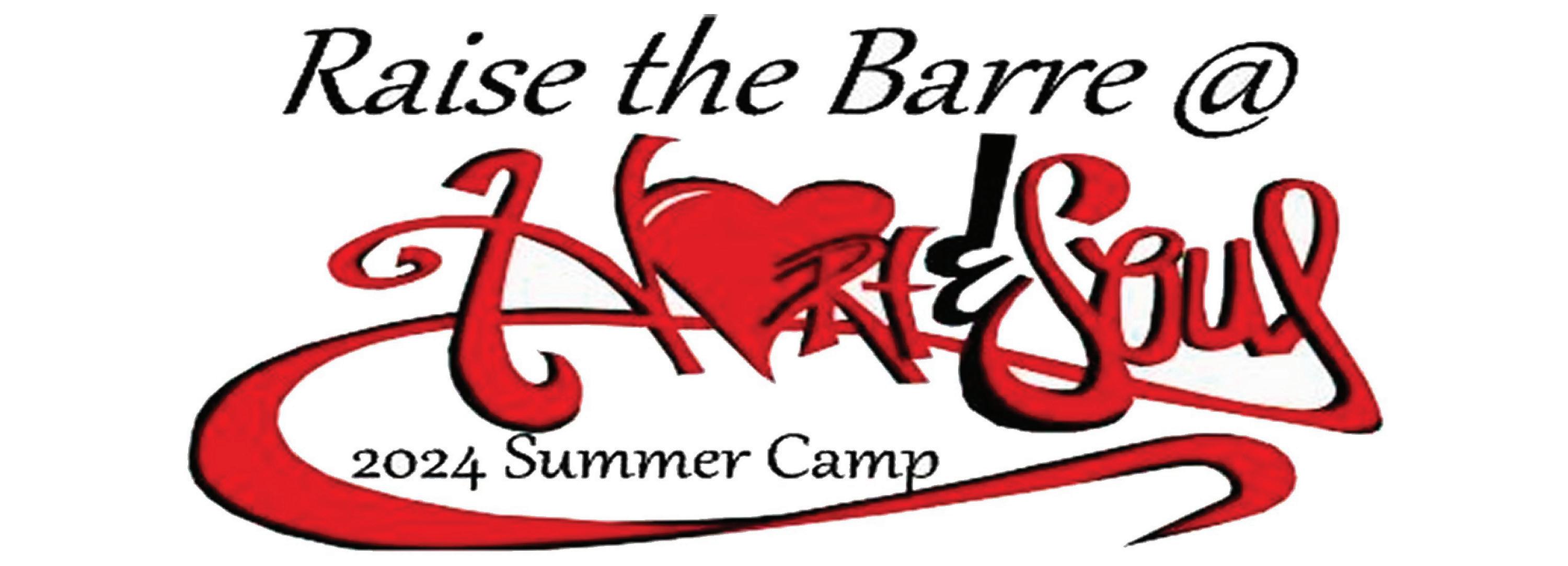


THE JEWISH STAR April 5, 2024 • 26 Adar II 5784 5
Israel
drown out NJ ‘intifada revolution’
backers
1251624 WINNER Learn From The Best... Be The Best! 1032 Broadway, Woodmere, NY 11598 (516) 295-2800 • email: Misstricia1@hotmail.com Hart & Soul Dance and Performing Arts Woodmere @hartandsouldancestudio Sibling diScountS available SuMMeR caMP Ballet/lyrical HipHop Jazz/Musical tHeatre tap conteMporary Monday-Friday 9am-4pm July 29tH-august 30tH 2024
When pro-Hamas demonstrators descended on a Teaneck shul on Monday, 1,000 local supporters of Israel turned out as well. Jewish Link
On LI, survivors recount horrors of Oct. 7…
gether in the safe room, holding the door shut, as they heard shooting, grenades, and the constant bombardment of munitions.
At 9 am, a friend sent a message in the group chat, asking anyone to help her husband, who was shot. The message mentioned that he was losing a lot of blood and he was just outside of Amit and Tomer’s home. Tomer went outside to try to find him.
“Of course I didn’t want him to leave, as I was hearing what was going on outside, but I stayed in the home with our three children,” Amit said. “I stood at the entrance of the room with our baby in one hand to try to keep her quiet and I had a kitchen knife in the other hand.”
Tomer returned and told her that he couldn’t see the man. He left again, but quickly rushed back into the house.
“He came back inside the house and said ‘I don’t want to put more pressure, but this is what I saw so we have to be quiet inside the house’,” Amit said.
Tomer said he heard about 20 to 30 terrorists yelling, so it was essential that the family keep quiet.
Around 10 am, Amit said that she lost electricity in her home, which created an unsafe environment inside the safe room, as it started to get very hot with little to no ventilation. When they cracked open the door to get some air circulating, Amit said that they started to smell gunpowder. She told Tomer that it’s not safe to breathe this in, but Tomer said “it’s better than to suffocate.”
For the next few hours, Tomer periodically left the room to get food for the kids and a bucket for them to go to the bathroom. Amit said that every time Tomer left the room, she stood at its entrance, guarding it. This was the routine that the Ades family would follow for the next 36 hours.
During the afternoon, Amit said that they started to lose cellular reception. She explained that the army turned it off because the terrorists

were using it to communicate with one another.
“I already sent my parents a goodbye message because I didn’t think that we were going to make it.”
Amit said that in a kibbutz, people typically don’t lock their doors. She said that she doesn’t even have a key to her home. Therefore, she and Tomer took all the furniture that they had in the house and put two piles of chairs in front of both entrances.
“On top of that, we put pots so it will make a lot of noise if someone entered,” Amit said.
As they tried getting some sleep, Amit said that the room began to get hot again. She opened the window in the safe room, which has metal in front of it to stop bullets from entering the room. The window is also noise-cancelling

The Chosen Paper
so when she opened it, the entire room instantly became very noisy with sounds of gunfire.
The family survived the night and on Oct. 8 celebrated Shir’s birthday by eating some of the cake that they had saved for his celebration.
Tomer and Amit made it their mission to not instill any fear in their kids. The older children were distracted by the fighting, as they spent most of their time on their iPad.
Amit mentioned that one of her children accidentally downloaded a SpongeBob movie before this attack so when the internet kept going off, they kept watching the movie over and over. The movie’s runtime was one hour and 41 minutes and for Amit, that number is still fresh in her mind.
“They watched the movie at least eight times,” Amit said. “Every time they finished, we told them to watch it again and again.”
By Sunday morning, Amit asked herself, “why is nobody coming?” She noted that the IDF was nowhere to be found.
“Two hours, four hours, six hours, night, morning — no one is coming,” Amit said.
At noon on Sunday, Amit went around the house with Tomer and saw bullet holes, shattered glass, and debris in various rooms.
“Then on Sunday afternoon, Tomer told me that we have to eat proper food and that we can’t eat anymore of the cake,” Amit said.
Tomer went to the kitchen to cook boiled eggs and Amit noted that she started to hear the gunfire get closer and closer. They went
back into the safe room, put the barriers back up, and stood at the entrance of the room with kitchen knives in both of their hands.
“Tomer tells me that if they come in the house, take the knife and aim for the neck,” Amit said.
Suddenly, Amit heard the pots fall.
“We kind of all said our goodbyes and then they came inside the house shooting,” Amit said.
Amit said she heard one of the people say the word “clear” in Hebrew. Amit started yelling “13” because that was the number of the Israeli rescue team that, according to What’s App, was saving people.
“They shouted at us ‘who are you?’ ‘What are your names?’ ‘What are your parents names?’ What is your ID number’?” Amit said. “And then they said ‘we’re opening the door, have nothing in your hands’ so we kind of dropped the knives and they opened the door.”
With the rifles aimed straight at Amit and Tomer, Amit said that she was both thankful that she was being saved by the IDF, but confused as to why they were pointing the guns at them.
“They told us that we have piles of bodies and blood on our front yard and because we had no connection for more than 24 hours, our household was considered dead,” Amit said.
“They weren’t coming for us, but they were coming to fight terrorists, which is why they entered the house shooting.”
A tank arrived to take them to a safer area. One of the commanders told Amit to tell her kids to not look around because of the dead bodies on the ground.
Amit saw a body lying right next to the safe room’s window and she later learned that the body was one of her and Tomer’s closest friends. He died alongside six other of Amit and Tomer friends. In total, Amit said 64 people from her kibbutz were murdered on that Saturday and 25 people were kidnapped.
Currently, Amit and her family are staying in a hotel in central Israel until September, when they will move into a temporary settlement in southern Israel. Then two years after that, they hope to be back in Kfar Aza.
Amit said that people in the United States can help her and other survivors like her by applying pressure to release the hostages. She said that when she moves to southern Israel, there will be more volunteer opportunities for people to help with mental health treatments, and general support for the children impacted by this war.
The Ades’ visit to Lynbrook was sponsored by the Kfar Aza Awareness Campaign of the Salanter Akiba Riverdale Academy.
More witnesses talk on LI
Israelis who experienced the Oct. 7 attacks joined members of several Nassau synagogues at Congregation Ohav Shalom, discussing their experiences and how American Jews can help communities in Israel.
“Are Israel and its citizens all by themselves in the world?” Rabbi Ira Ebbin asked. “There’s one thing that I’m absolutely certain about — the answer to the question is unequivocally no..”

Shani Goren and Omar Vehab, residents of Kibbutz Nir Oz, recounted what happened to them when terrorists stormed into their community near the Gaza border. Hamas killed, injured or took captive about one-quarter of its residents.
Goren, who addressed the crowd in Hebrew through a translator, was kidnapped. She spent 55 days as a hostage in Gaza.
—Jordan Vallone, LI Herald
April 5, 2024 • 26 Adar II 5784 THE JEWISH STAR 6 LEGAL NOTICE ASSESSOR’S NOTICE OF COMPLETION OF THE FINAL ASSESSMENT ROLL THE ASSESSOR OF THE COUNTY OF NASSAU HEREBY GIVES NOTICE that he has completed the 2024/2025 final assessment roll, which will be used for the 2025 levy of Town and County Taxes in the Towns of Hempstead, North Hempstead and Oyster Bay, and the City of Glen Cove and the City of Long Beach, and for the 2024/2025 levy of school taxes in such Towns and in the City of Long Beach. A certified electronic copy of the roll was filed with the Department of Assessment on April 1, 2024. The electronic roll may be examined on public terminals located in the offices of: DEPARTMENT OF ASSESSMENT NASSAU COUNTY OFFICE BUILDING 240 OLD COUNTRY ROAD, FOURTH FLOOR MINEOLA, NY 11501 where the same will remain open for public inspection for fifteen days. Dated this 1st day of April 2024. JOSEHA A. ADAMO Chief Deputy Assessor, Nassau County 145927 Public Notices LSTA1 0404 Search for notices online at: www.newyorkpublicnotices.com
Continued from page 1
The Ades’ once tranquil backyard is now a scene of war, after Hamas attacked their home in the Kfar Aza kibbutz on Oct. 7.
1249982 • Training and Support • Computer Repairs and Tuneups • Consulting from Purchase to Setup • PC and iPhone Training 5 Towns Computer Services 718-490-0192 In Person and Remote Computing Solutions Expert Personal Care 1249975
New York’s most trusted Jewish newspaper. Honest reporting. Torah-true.



THE JEWISH STAR April 5, 2024 • 26 Adar II 5784 7 PARKER CARE. THE BEST. FOR THE BEST. Post-Acute Care | Sub-Acute Care | Short-Term Rehabilitation | Long Term Care | Hospice Palliative Care | Inpatient/Outpatient Dialysis | Home Health Care | Medical House Calls Senior Care Management 271-11 76th Avenue New Hyde Park, NY 11040 I 877-727-5373 I parkerinstitute.org 1243624

Sunday April 7th 10:00 PM - 8:00 PM
Daily Hours: Sun 12pm–4pm • Tues–Sat 11am–7pm PLEASE JOiN US FOR
Over 50 Styles of Dresses, Tops & Skirts To Shop From For Passover. Sizes: XS-3X

516-500-9445

235 Nassau Blvd. West Hempstead
April 5, 2024 • 26 Adar II 5784 THE JEWISH STAR 8 1251699
Pre-Pesach
Albany pols supporting news ‘sustainability act’
By LI Herald
A group determined to save local news in New York rallied in Albany in an effort to bring more lawmakers to their cause.
The Empire State Local News Coalition — a statewide advocacy group of more than 150 local news outlets — joined elected officials at the state capital last week to support the Local Journalism Sustainability Act.
The bill is intended to provide tax credits to local news outlets that employ journalists in their communities. One of its sponsors — WestsideManhattan state Sen. Brad Hoylman-Sigal — was joined at the rally by Valley Stream Assemblymember Michaelle Solages, Brentwood state Sen. Monica Martinez, and Queens Assemblymember David Weprin.
“This is a full-blown crisis,” Hoylman-Sigal said. “We live in a deliberative democracy. That means our voters need to be informed to make wise choices. How are they informed? Largely through local news.”
The senate included the Local Journalism Sustainability Act in its One House budget resolution, which organizers describe as a major sign of the bill’s growing support in the legislature.
Both the senate and the Assembly release preliminary One House budgets in response to the governor’s own preliminary budget, which was released earlier this year. The state’s final budget, due April 1, will be voted on soon. Saratoga Springs Assemblymember Carrie Woerner sponsored the bill in that chamber.
“It is time that New York state steps

up and supports one of the most important industries — not just to our economic well-being, but to our democracy,” Hoylman-Sigal said.
The rally was intended to signal growing pressure on lawmakers to offer benefits to the local news industry, which has experienced a significant downturn over the past two decades.
Hundreds of newspapers in New York State have closed since 2004, resulting in the loss of not only thousands of jobs, but also thousands of stories that helped keep communities informed. In fact, there are a growing number of communities with little to
no access to local newspaper coverage, according to coalition officials.
Capped at $20 million statewide, the Local Journalism Sustainability Act is a bill with bipartisan support that provides payroll tax credits for the employment of local news journalists.
News organizations would receive a 50 percent refundable tax credit against the first $50,000 of each newsroom employee’s salary, up to $200,000 per outlet.
The benefit would be limited to print and online newspapers and broadcasters, with 100 employees or less, that cover local community

news. This, supporters say, ensures that only truly local news outlets will qualify for this assistance.
“Someone once said that ‘newspapers are the textbooks of democracy, and the lifeblood of freedom,’ and that’s a responsibility newsrooms like ours take very seriously,” said Michael Hinman, executive editor of Herald Community Newspapers, which employs more than 30 journalists across 24 newspapers on Long Island and in New York City.
“Communities depend on their local newspaper. Time and time again, it’s been proven that the best com-
munities in America are communities with a strong, local newspaper. And if we don’t do something now, those great communities will be lost to history.”
But in order for this bill to move forward, it needs to be supported not just by the senate, but also by the Assembly and by Gov. Kathy Hochul, so that it is included in the final state budget.
“The fight to save local news is a fight to save our democracy,” said Zachary Richner, founder of the Empire State Local News Coalition and director of Richner Communications, parent company of Herald Community Media and The Jewish Star. “Hometown newspapers deliver the hyperlocal updates and investigations necessary to sustain a community’s civic and financial well-being. As local news declines, critical stories are lost, and communities become more polarized.”
Solages says she’ll continue to push for the bill’s inclusion in the final state budget with her colleagues in the Assembly.
“We’re continuing our work on Long Island making sure the local story — the story that matters to individual New Yorkers — are heard,” Solages said. “But we really need to make sure we are investing into our community, investing into local journalism, and combatting this growing social media that is spreading misinformation.”
“Our local papers are here. They are objective. They provide information. And we need to preserve that,” she said.

THE JEWISH STAR April 5, 2024 • 26 Adar II 5784 9
Your Jewish Star workplace can be almost anywhere. Long Island, NYC, Starbucks. Where you work is less important than what you accomplish. Our editorial and marketing positions are hybrid, allowing tremendous flexibility. You can make a great impact on New York’s Orthodox communities from your local park, or Starbucks, or your home office, as well as at our workplaces in Garden City and Riverdale where our teams collaborate and inspire each other. So don’t be put off by a ride on the LIRR, MetroNorth or the #1, or by traffic on the LIE or the GWB. If a Jewish Star position calls out to you, you owe it to yourself to call back. Enjoy working for a media company devoted to honest journalism, whose goals are Torah-true, and where all Jewish holidays are observed. Email your inquires and expressions of interest to Publisher Ed Weintrob: EWeintrob@TheJewishStar.com 1252045 1218804 Help get the news out! DRIVERS WANTED Deliver newspapers (The Jewish Star and others) to stores and buildings in Nassau, Queens and Riverdale. Excellent income opportunity. Work hours on Wednesdays and Thursdays, with possible additional assignments. Must have suitable vehicle, clean license. 516-622-7461 x291 • Publisher@TheJewishStar.com
Valley Stream Assemblymember Michaelle Solages joins lawmakers and supporters like Queens Assemblymember David Weprin, at left, and Manhattan state Sen. Brad Hoylman-Sigal, at right, at an Albany event where she called on her colleagues to support the Local Journalism Sustainability Act. Empire State Local News Coalition



April 5, 2024 • 26 Adar II 5784 THE JEWISH STAR 10 1252919 SaveNYLocalNews.com Sign this letter to show Albany you support local newsrooms I NY LOCAL NEWS PASS the Local Journalism Sustainability Act now! 1248710 1209448
WINE AND DINE
Preparing for a joyous Pesach, despite it all
Kosher Kitchen
JoNI SchocKEtt Jewish Star columnist

This year, a raging war, increased antisemitism, and trouble on our college campuses weighs heavily on all our minds. We struggle with so many issues, all the while praying for those innocent hostages and a road to a lasting peace.
I wonder how and why antisemitism has exploded throughout the world as ugly as the long-forgotten pogroms in Kiev, then called Huchov, that sent my grandfather, his mother and seven siblings to America after the Cossacks killed my great-grandfather. Later, hatred spawned the Holocaust and the fear that Jews felt worldwide.
We are three weeks from Passover. Each Shabbat, I pray that this will be the last one the hostages face in captivity and that they — and we — will greet Passover as a renewed holiday of freedom.
Still, despite the news cycles and more, Passover will arrive and there are things that need to be done. For me? As usual, a low-level panic is setting in. It always moves in at this time of year and doesn’t leave until after the last Seder dishes are put away. There is just so much to do and no matter how much time there is, it seems as though there is never enough. Each year, I worry whether I will get it all done. Each year, somehow, it does! My sense is that this Pesach preparation anxiety is universal among my friends who change their homes over for Passover. We commiserate over Facebook and the phone, support each other, and give pep talks, comfort, and love. It is reassuring to know that so many are doing exactly what you are doing and it’s fun to compare notes, and lists, and guest numbers, and, of course, recipes.
We are a sisterhood of women, all trying to ensure a kosher Pesach with delicious food made with the best ingredients. I feel blessed to have such a community, and I hope you all have one, too.
Even with all this support and friendship, there are always some unforeseen stressors, like last-minute food mishaps and last-minute guests. I have often had as many as eight unexpected, yet welcomed, guests at my Seder table – especially when my kids were in college and often brought home several friends. When that happens, I am left trying to add to
the menu without looking like it’s last minute.
I want these guests to feel as important as those I invited a month before. So I always make something that will expand without additional stress. The potato kuglettes and vegetable kuglettes are examples. I make about 50 of them before the holiday and freeze them. If extra guests arrive, I just take a few more out of the freezer. We eat the rest throughout the week.
When I am really stressed, I think of my grandmother who fed more than 25 relatives at each Seder every Pesach. She had a stone sink, a wooden bowl and a hand chopper, an old wooden ice box, an oven that barely held two 9x13 pans, and several pots and pans that she rotated on her small four-burner stove.
And yes, there were fish in the bathtub!
In fact, one year, at the Seder, my 3-year-old cousin was so angry that the fish were gone, that she locked herself in the bathroom which finally necessitated a call to the fire department to free her!
Somehow, there was always much more than enough food for two nights. I cannot even imagine how my great-grandmother fed her family in a shtetl in Huchov with no running water and an open-hearth fire.
So, Pesach will happen as it has for thousands of years. Everything will get done in all our kitchens as we use all our gizmos and gadgets, time savers, freezers, huge ovens, and more. And, this year, we will add prayers for the hostages, prayers that they will, like our ancient ancestors, soon see freedom.
I wish you all a zissen Pesach, a sweet holiday, filled with love of family and friends.
Potato, Leek and Shallot Kuglettes (Pareve)
I make these in advance, pop them in a freezer bag and freeze then for a few days. Before baking, I brush them with Safflower oil to make them crisp as they bake. They are GF, also!
• 4 medium to large onions, finely chopped
• 1 cup leeks, finely chopped, white and light green parts only
• 1/2 cup chopped shallots, about 3 to 5 shallots
• 1-1/2 lb. Yukon Gold Potatoes, peeled
• 2 lb. Russet potatoes, peeled
• 1 bunch scallions, finely chopped
• 4 extra-large eggs
• 2 Tbsp. potato starch
• 1 to 2 tsp. kosher salt and freshly ground black pepper to taste
• 1/2 tsp. each baking powder and baking soda
• Vegetable or Safflower oil


Preheat the oven to 400 degrees. Generously grease 2 or 3 (12-cup) muffin tins or use paper liners that are generously sprayed with non-stick spray
Peel and finely chop the onions using the “s” blade of a food processor. Pieces should be about 1/8 to 1/4 inch. Scrape into a large mixing bowl and cover to avoid the onion fumes.
Slice the leeks and add to the bowl of the food processor. Pulse several times to chop the slices. Scrape into the bowl with the onions.
Peel the shallots and add to the bowl of the food processor. Pulse to finely mince. Scrape into the bowl.
Cut the scallions, green and white parts, into half inch pieces. Place in the bowl of the food processor and pulse to finely chop. Scrape into the bowl.
Change to the shredding disc and shred the potatoes. Place in a new large bowl. Take handfuls and squeeze out as much liquid as possible. Add the potatoes to the bowl of onions and repeat until all the potatoes have been added to the bowl. Mix well to evenly distribute the onions, leeks, shallots and scallions.
Add the eggs and mix thoroughly. Add the potato starch salt and pepper and mix thoroughly. Add a teaspoon of oil to each muffin cup. Add a spoonful of the potato mixture and fill the cup just to the top.
Place in the oven and cook until deep golden brown, about 30 to 45 minutes. Let cool and remove from the muffin cups using a plastic spoon. They should pop out easily. Place in a freezer bag and freeze until needed.
To Reheat: Line a large rimmed baking sheet with foil. Place the kuglettes on the pan close together. Brush lightly with Safflower oil and bake until crispy, about 25 to 40 minutes. Makes 24 to 30 pieces.
GF Broccoli, Cauliflower and Vegetable Kuglettes (Pareve)
I have been making these for years and have recently seen them in several magazines! This is another” make ahead and use as many as you need” side dishes.
• 1/4 cup extra virgin olive oil
• 3 large onions, finely chopped
• 2 bunch scallions, white and green parts, finely chopped
• 5 cups very small (1/2 inch) broccoli florets
• 5 cups very small (1/2 inch) cauliflower florets
• 6 large eggs
• 1/4 cup GF matzah cake meal
• 1/2 cup finely minced fresh parsley
• 1/4 cup finely minced fresh dill
• 2 to 3 tsp. salt, to taste
• 1 tsp. pepper
OPTIONAL: Add chopped red or green pepper, chopped mushrooms, pre-cooked asparagus or diced carrots, chopped baby spinach leaves, baby kale leaves, chopped leeks, garlic or any other veggies you like. (Not zucchini – too much water!)
Top with toasted chopped almonds or walnuts.
Preheat the oven to 400 degrees. Generously grease 2 (12-cup) muffin tins. (Have an extra 6 cup tin available.) Set aside.
Process the onions and scallions in a food processor until finely chopped, but not minced.
Heat a large skillet and add the olive oil. Add the onions and scallions and sauté until lightly golden. Scrape into a large bowl and add the rest of the ingredients. Mix until completely blended. Let the mixture sit for 15 minutes to thicken slightly. Spoon into the prepared tins and place in the oven. (You may have enough mixture for another 2 to 6 kuglettes.)
Bake until deeply golden, 60 to 70 minutes. Remove from the oven and let cool before removing. Let cool completely and place in a plastic bag or wrap each in plastic wrap. Freeze and use as needed. Makes 24 to 30 kuglettes.
Mocha Meringues (Pareve)
Easy last minute dessert. I make them early in the morning and when cool, I place them in airtight container until needed. You can drizzle with melted chocolate.
• 3 large egg whites
• 3/4 cup sugar
• 1/2 tsp. white vinegar
• 1 tsp. pure vanilla extract
• 2 Tbsp. unsweetened cocoa powder
• 2 tsp. instant coffee or espresso powder
• 1/2 cup finely chopped bittersweet chocolate or mini-chocolate chips or chocolate sprinkles
Preheat the oven to 300 degrees. Line two baking trays with parchment paper. Set aside.
See
THE JEWISH STAR April 5, 2024 • 26 Adar II 5784 11
Despite
horrors on page 14
world
Instead serving this slice of a large kugel, prepare individual kuglettes, which store easily and can be easily added to your menu when extra guests arrive. Adobe
Mocha Meringues.

































































April 5, 2024 • 26 Adar II 5784 THE JEWISH STAR 12 SALE DATES: April 7 - 12, 2024 WEEKLY CEDARHURST 137 Spruce Street · 516-569-2662 Sun-Tue: 7am-9pm · Wed: 7am-11pm · Thurs: 7am-12am Fri: 6:30am-2 hours before candle lighting WOODMERE ONLINE 1030 Railroad Ave · 516-295-6901 Sun-Wed: 7am-9pm · Thurs: 7am-10pm Fri: 6:30am-2 hours before candle lighting Shop online at GourmetGlattOnline.com gourmetglatt BUYS OF THE WEEK Specials $1299 REFRIGERATED & FROZEN SALES Gold’s Horseradish White or Red - 8 oz B’gan Flounder Fillet 14 oz Meal Mart Chopped Liver 12 oz Givat YoGo Lite Yogurts 5 oz Gefen Frozen Garlic Cubes 2.8 oz Norman’s Low Fat Yogurts Assorted - 5.3 oz Klein’s Dixie Cup Ice Cream Dairy, Parve or Sorbet 12 Pack Bowl & Basket Egg Whites 32 oz Givat Whipped Cream Cheese 8 oz La Yogurt 6 oz Givat Cottate Cheese 16 oz $699 A & B Gefilte Fish 20 oz Ha’olam Slims Mozzarella, Muenster, Cheddar - Except Oven Smoked Muenster - 6 oz Bodek Cauliflower or Broccoli Florets 24 oz Abe’s Parvelicious Ice Cream Except Sugar-Free 56 oz Yarden Strawberries 14 oz Sonny & Joe’s Dips & Spreads Except Babaganoush 7 oz Spring Valley Blintzes 13 oz Meal Mart Chik’n Turkey Shape Nuggets 32 oz $1399 Ha’olam American Cheese 108 Slices - 3 LB Beleaf Fries Straight, Crinkle or Steak - 26 oz Ha’olam Ricotta 16 oz $299 $299 $199 $499 2/$5 $349 Tropicana Orange Juice Assorted - 52 oz $299 69¢ $499 2/$5 Dyna Sea Sticks 16 oz Unger’s Non-Dairy Topping 16 oz $499 $399 $1199 $349 $249 $599 $399 Norman’s Greek Yogurt Except Pro - 5.3 oz 4/$5 $299 ITEM UPC DESCRIPTION UOM CASE PRICE 710800 840762098002 F ench ries S aigh Cut 26 o 12 $33.50 $33.50 FRO PRODUCT French Fries Freshly Frozen Grade A Premium Heinz Ketchup 24.7 oz Lieber’s Potato Starch 24 oz Can Streit’s Matza 5 LB Lieber’s Vegetable Oil 96 oz Rorie’s Full n Free Grain-Free All Purpose Flour Blend 32 oz $389 Domino Sugar 4 LB Tuscanini Tomato Sauce 17.6 oz Schmerling Chocolate Bars Assorted - 3.5 oz Hollywood Safflower Oil 32 oz Tuscanini Pasta Sauce Assorted - 24 oz Oberlander Rainbow or Chocolate Leaf Cookies 12 oz Streit’s Pancake Griddle Mix 12 oz Taster’s Choice Original House Blend Coffee 14 oz Osem Soup Mix Assorted - 14.1 oz Taanug Munch Cereal Chocolate or Vanilla 5.5 oz $179 Streit’s Matzoh Farfel 16 oz Gefen Olive Oil Spray 5 oz Gefen Crisp Flats Assorted - 5.3 oz Gefen Apple Juice Box Drinks 3 Pack $299 Tradition Chicken Cup-a-Soup 2 oz Goldbaum’s White Quinoa 12 oz Gefen 7-9 Cucumbers in Brine 19 oz Glick’s Hot Sauce 5 oz $199 $299 Dagim Solid White Tuna In Water Only - 6 oz BUYS OF THE WEEK $219 Streit’s Matzo Meal 16 oz $279 $879 $329 $899 $139 Streit’s Macaroons Assorted - 10 oz Tuscanini Preserves Assorted - 11.64 oz Osem Mini Croutons Rings 5.3 oz Haddar Spices Assorted - 1.23 oz $1499 $1099 $299 $349 $799 2/$3 $399 KFP KFP KFP KFP KFP KFP KFP KFP KFP KFP KFP KFP KFP KFP KFP KFP KFP KFP PASSOVER SAVINGS ON GROCERIES! Gourmet Glatt $699 $349 $479 Heaven & Earth Iced Tea or Lemonade Assorted - 32 oz KFP KFP KFP KFP KFP 99¢ 3/$4 $219 $169 $399 KFP KFP KFP KFP KFP $499 2/$5 $699 $349 $399 $269 $599 Passover Roasted Cashews 14 oz Passover Mango Cheeks 10 oz 69¢ 79¢ $499
















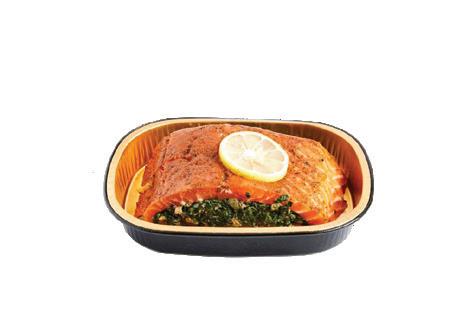







THE JEWISH STAR April 5, 2024 • 26 Adar II 5784 13 SALE DATES: April 7 - 12, 2024 We reserve the right to limit quantities. No rain checks. Not responsible for typographical errors. CEDARHURST 137 Spruce Street · 516-569-2662 Sun-Tue: 7am-9pm · Wed: 7am-11pm · Thurs: 7am-12am Fri: 6:30am-2 hours before candle lighting WOODMERE ONLINE 1030 Railroad Ave · 516-295-6901 Sun-Wed: 7am-9pm · Thurs: 7am-10pm Fri: 6:30am-2 hours before candle lighting Shop online at GourmetGlattOnline.com gourmetglatt FRESH PRODUCE WEEKLY Specials Grape Tomatoes Roasted Red Pepper Dip $299 ea. ossiesfish.com Classic Chummus $299 ea. Assorted 7 Layer Cakes Assorted Fancy Mini Cookies Italian Bread Russian Health Bread Ratatouille Salad $599 lb. $299 lb. $199 ea. All Items are Kosher for Passover! Macintosh Apples PREMIUM MEAT & POULTRY Boneless Fillet Steak $1349 lb. Chuck London Broil $289 lb. Whole or Cut-Up Pullets $2499 Ib Standing Rib Roast Bone-In $1299 lb. $279 Ib. Chicken Legs Super Family Pack Schwartz Kichel Regular or Sugared $799 ea. New! Green Grapes Large Navel Oranges Cello Mushrooms 8 oz $1249 Ib 1st Cut Brisket Beef Neck Bones $499 lb. Tri-Color Pasta Silver Tip Roast $1049 lb. Small Potato Kugel $399 lb. Parve Cholent White Chicken Cubes $799 lb. $1099 lb. Spicy Onion Dip $299 ea. Roasted Eggplant $699 ea. English Style Fish Balls $999 ea. $999 Ib. Ground Beef Crunchy Pickle Dip $299 ea. Extra Lean Beef Stew $799 lb. Charif Dip $399 ea. Bronzini Fillet Tuna Poke Cubes “Breaded” Flounder 18 $1599 lb. Salmon Florentine $16 Family Pack Corned Beef Deckle Juicy Lemons 4/$3 Chicken Drumsticks Family Pack $269 lb. Neck & Skirt FROM THE HOT TABLE $699 ea. Family Pack $649 lb. $699 lb. Mushroom Salad Solomon’s Navel Pastrami $899 lb. Turkey London Broil $649 lb. Chicken Wings $179 lb. Shoulder London Broil $1049 lb. 4/$5 Wow! Order Your Shabbos Pla ers Early! We Love Our Customers! DON’T SEE IT? ASK! WE’LL BE HAPPY TO MAKE IT FOR YOU! California Roll $695 Cooked Salmon Roll $795 $1395 Black Dragon Roll $1495 Godzilla Roll 69¢lb. Baked Salmon with 3 Side Dishes SUNDAY - WEDNESDAY THURSDAY & FRIDAY Southern Baked Chicken Bottoms Jumbo Franks in Blankets $699 lb. $1199 ea. Sugar-Free Summer Slaw $599 lb. BUY 1 SOUTHERN FRIED CHICKEN GET 1 LB POTATO OR CUCUMBER SALAD FREE! $1199 lb. Butternut Squash Soup Quart SCAN CODE TO SEE OUR FULL PASSOVER MENU! $1199 lb. Macaroni & Cheese 24 oz Container $999 ea. THE MEAT DEPARTMENTS IN OUR CEDARHURST & WOODMERE LOCATIONS ARE NOW KOSHER FOR PASSOVER (Unless Label Specifies Otherwise) Super Family Pack $299 lb. Cleaned & Trimmed Lamb Shanks $999 lb. Kasha Knish Garlic Chicken $249 ea. $1999 lb. $299 ea. Whole Chicken Vegetable Lo Mein $699 lb. $499 ea. Shoulder Lamb Chops $1699 lb. White Turkey Roast $549 lb. Cut in 1/4s or 1/8s Family Pack Whole Brisket Untrimmed $699 lb. Great for Smoking! $549 lb. Large Potato Kugel $799 lb. 6/$2 2/$3
Despite world horrors, we will celebrate anew…
Continued from page 11
Place the egg whites in the bowl of an electric mixer. Beat on medium until soft peaks form. Add the sugar, one tablespoon at a time until stiff peaks form. Add the vinegar, vanilla, cocoa and the coffee and mix well.
Remove the bowl from the stand and add the chopped chocolate. Mix with a spatula to evenly distribute the chocolate. Place same sized dollops of the batter, a bit less than 2 inches in diameter, on the parchment lined cookie sheets and place in the oven.
Bake for about 20 to 25 minutes. Turn the oven off and open the oven door slightly. Let cool for about an hour undisturbed.
OPTIONAL: Drizzle lightly with melted chocolate. While the cookies are still on the parchment, melt about 2 ounces of semi-sweet chocolate in the microwave. Dip the tines of a fork in the chocolate and wave the fork over the cookies so the chocolate makes thin drizzles over them. Alternatively, dust with cocoa powder. Makes about 30 cookies.
OPTIONAL: You can make 60 small cookies and make sandwiches by placing a dollop of the melted chocolate between two cookies.
Lemon Glazed Almond Torte (Pareve)
• 7 extra-large eggs separated
• 3/4 cup sugar
• 2 cups coarsely ground almonds, measure after processing
• Rind of one large lemon or two smaller ones
• Glaze:
• 1/2 cup plus two Tbsp. freshly squeezed lemon juice
• 1/2 cup plus 2 Tbsp. sugar
• Zest from one lemon
Preheat the oven to 325 degrees. Lightly grease a 9-inch spring-form pan and set aside.
Beat the egg whites until stiff but not dry and set aside. In another bowl, beat the egg yolks until well blended, add the sugar and beat until smooth and a bit lightened in color.
Place the almonds in a food processor and pulse until well ground, but not powdery. Using a zester or box grater, grate the rind of one lemon and add to the eggs. Mix well. Add the ground almonds.
Fold in the beaten egg whites and pour the batter into the prepared pan. The batter will be very thick. Smooth the top and bake for 45 to 55 minutes or until the top is golden.
Meanwhile, place the lemon juice, sugar, and zest in a small saucepan. Bring to a boil and reduce the heat, stir until all the sugar is dissolved. Remove from heat.
Prick the top of the cake all over with a skewer. Pour the glaze over the cake and let the glaze seep into the cake for 10 to 12 minutes. Run a knife around the rim of the cake, remove the sides, and place the cake on a serving platter. Garnish with powdered sugar and fresh, thinly sliced, sugared lemon slices. Serves 8 to 12

D’Esposito pushes House Dems on Israel
By Mike Wagenheim, JNS
The Republican congressmember representing the Five Towns has introduced a resolution expressing Congress’ sense “that Israel must be in full support of any negotiation or agreement relating to the Israeli-Hamas conflict, including a two-state solution or similar long-term plan relating to Israel and Palestinians for it to move forward.”
H.Res.1107 would put House Democrats on record to “really show if they’re supporting Israel” and demonstrate whether his colleagues across the aisle “are committed to eradicating

the terrorist organizations that have caused so much damage, or are they willing to stand because of politics, with the leadership of their party,” Rep. Anthony D’Esposito told JNS.
He criticized the recent speech by Senate Majority Chuck Schumer in which Schumer called for Israeli elections to replace Prime Minister Benjamin Netanyahu, and also President Joe Biden for not opposing the speech.
“It’s comparable to, in the days following Sept. 11, that a foreign country would call for the removal of the president of the United States of America. I just find it completely pre-
posterous,” D’Esposito said.
D’Esposito said that Biden and Schumer are “trying to pander to the far left, and especially states like Michigan and elsewhere, and college campuses.”
“If we don’t think that this is political, we’re crazy,” he said. “Joe Biden’s poll numbers are in the dumpster, and he is losing ground in places where he has historically done very well — in places like Michigan — and this is his attempt at trying to bring that base back to his side.”
“Quite frankly, it’s disgusting,” he said.









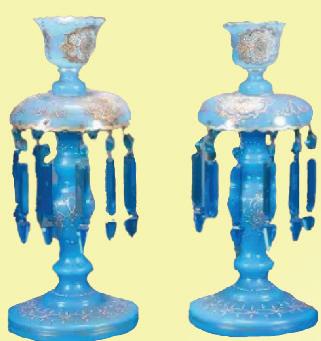







April 5, 2024 • 26 Adar II 5784 THE JEWISH STAR 14
Almond cake with lemon icing.
Adobe
1251625 1252559







































































































































1252950
jewish star torah columnists:
•Rabbi Avi Billet of Anshei Chesed, Boynton Beach, FL, mohel and Five Towns native •Rabbi David Etengoff of Magen David Yeshivah, Brooklyn
•Rabbi Binny Freedman, rosh
yeshiva of Orayta, Jerusalem contributing writers:
•Rabbi Sir Jonathan Sacks zt”l,
former chief rabbi of United Hebrew Congregations of the British Commonwealth •Rabbi Dr. Tzvi Hersh
Weinreb, OU executive VP emeritus
•Rabbi Raymond Apple, emeritus
rabbi, Great Synagogue of Sydney
•Rabbi Yossy Goldman, life rabbi emeritus, Sydenham Shul, Johannesburg and president of the South African Rabbinical Association.
contact our columnists at: Publisher@TheJewishStar.com
Five towns candlelighting: From the White Shul, Far Rockaway, NY
Fri April 5 / 26 Adar II
Shmini • Shabbos Mevarchim Candles: 7:06 • Havdalah: 8:16
Fri April 12 / Nisan 4
Tazria Candles: 7:13 • Havdalah: 8:23
Fri April 19 / Nisan 11
Shabbos HaGadol •Metzora
Candles: 7:21 • Havdalah: 8:31
Mon April 22 / Nisan 14
Erev Pesach • First Seder
Candles: 7:24
Tue April 23 / Nisan 15
Second Seder
Candles: 8:25 • Wed Havdalah: 8:35
Fri April 26 / Nisan 18
Shabbos Chol Hamoed
Candles: 7:28 • Havdalah: 8:38
Sometimes, spontaneity is good, sometimes not
rabbi sir jonathan sacks zt”l

Shemini tells the tragic story of how the great inauguration of the Tabernacle, a day about which the Sages said that G-d rejoiced as much as He had at the creation of the universe, was overshadowed by the death of two of Aaron’s sons, Nadav and Avihu:
Aaron’s sons Nadav and Avihu took their censers, put fire in them and added incense; and they offered unauthorized fire before the L-rd, which [G-d] had not instructed them [to offer]. Fire came out from the Presence of the L-rd and consumed them, and they died before the L-rd. Lev. 10:1-2
Many explanations were given by the Sages and later commentators as to what Nadav and Avihu’s sin actually was. But the simplest answer, given by the Torah itself here and elsewhere (Num. 3:4, Num. 26:61), is that they acted on their own initiative. They did what they had not been commanded. They acted spontaneously, perhaps out of sheer enthusiasm in the mood of the moment, offering “unauthorized fire”. Evidently it is dangerous to act spontaneously in matters of the spirit.
But is it?
Moses acted spontaneously in far more fraught circumstances when he shattered the Tablets of Stone upon seeing the Israelites cavorting around the Golden Calf. The tablets — hewn and engraved by G-d Himself — were perhaps the holiest objects there have ever been. Yet Moses was not punished for his act.
The Sages said that though he acted of his own accord without first consulting G-d, G-d assented to this act. Rashi refers to this moment in his very last comment on the Torah, whose last verse (Deut. 34:12) speaks about “all the strong hand, and all the great awe, which Moses performed before the eyes of all Israel.”
This refers to when Moses] took the liberty of shattering the tablets before their eyes, as it is said, “I shattered them before your eyes.” The Holy One, Blessed be He, consented to his opinion, as it is said, “which you shattered” — more power to you for shattering them!
Why then was spontaneity wrong for Nadav and Avihu yet right for Moshe Rabbeinu? The answer is that Nadav and Avihu were Kohanim, Priests. Moses was a Navi, a Prophet. These are two different forms of religious leadership. They
Priests were forbidden to act spontaneously, but Prophets did so as a matter of course.

involve different tasks, different sensibilities, indeed different approaches to time itself.
The Kohen serves G-d in a way that never changes over time (except, of course, when the Temple was destroyed and its service, presided over by the Kohanim, came to an end). The Prophet serves G-d in a way that is constantly changing over time. When people are at ease the Prophet warns of forthcoming catastrophe. When they suffer catastrophe and are in the depths of despair, the Prophet brings consolation and hope.
The words said by the Kohen are always the same. The priestly blessing uses the same words today as it did in the days of Moses and Aaron. But the words used by a Prophet are never the same. As it is noted:
No two Prophets use the same style. Sanhedrin 89a
So for a Prophet spontaneity is of the essence. But for the Kohen engaged in Divine service it is completely out of place.
Why the difference? After all, the Priest and the Prophet were serving the same G-d.
The Torah uses a kind of device we have only recently re-invented in a somewhat different form. Stereophonic sound — sound coming from two different speakers — was developed in the 1930s to give the impression of audible perspective. In the 1950s 3D film was developed to do for sight what stereo had done for sound. From the work of Pierre Broca in the 1860s to today, using MRI and PET scans, neuroscientists have striven to understand how our bicameral brain allows us to respond more intelligently to our environment than would otherwise have been possible. Twin perspectives are needed fully to
experience reality.
The twin perspectives of the Priest and Prophet correspond to the twin perspectives on creation represented, respectively, by Genesis 1:1–2:3 (spoken in the priestly voice, with an emphasis on order, structure, divisions and boundaries), and Genesis 2:4–3:24 (spoken in the prophetic voice, with an emphasis on the nuances and dynamics of interpersonal relationships).
Now let us consider one other area in which there was an ongoing argument between structure and spontaneity, namely tefillah, specifically the Amidah. We know that after the destruction of the Temple, Rabban Gamliel and his court at Yavneh established a standard text for the weekday Amidah, comprising eighteen or later nineteen blessings in a precise order (Mishnah Brachot 4:3).
Not everyone, however, agreed. Rabbi Joshua held that individuals could say an abridged form of the Amidah. According to some interpretations, Rabbi Eliezer was opposed to a fixed text altogether and held that one should, each day, say something new (Talmud Yerushalmi Brachot 4).
It seems that this disagreement is precisely parallel to another one about the source of the daily prayers:
It has been stated: R. Jose, son of R. Hanina said: The prayers were instituted by the Patriarchs. R. Joshua b. Levi says: The prayers were instituted to replace the daily sacrifices. Brachot 26b
According to R. Jose, son of R. Hanina, Shacharit was established by Abraham, Minchah by Isaac, and Maariv by Jacob. According to R. Joshua b. Levi, Shacharit corresponds to the
daily morning sacrifice, and Minchah to the afternoon sacrifice. On the face of it, the disagreement has no practical consequences, but in fact it does.
If the prayers were instituted by the patriarchs, then their origin is prophetic. If they were established to replace the sacrifices, then their provenance is priestly. Priests were forbidden to act spontaneously, but Prophets did so as a matter of course.
Someone who saw prayer as priestly would, like Rabban Gamliel, emphasize the importance of a precise text. One who saw it as prophetic would, like Rabbi Eliezer as understood by the Talmud Yerushalmi, value spontaneity and each day try to say something new.
Tradition eventually resolved the matter in a most remarkable way. We say each Amidah twice, once privately and silently in the tradition of the Prophets, then a second time publicly and collectively by the shaliach tzibbur, the “reader’s repetition,” in the tradition of a Priest offering a sacrifice at the Temple. (It is easy to understand why there is no reader’s repetition in the Maariv service: there was no sacrifice at night-time).
During the silent Amidah we are permitted to add extra words of our own. During the repetition we are not. That is because Prophets acted spontaneously, but Priests did not.
The tragedy of Nadav and Avihu is that they made the mistake of acting like Prophets when they were, in fact, Priests. But we have inherited both traditions, and wisely so, for without structure, Judaism would have no continuity, but without spontaneity it would have no fresh life.
The challenge is to maintain the balance without ever confusing the place of each.
April 5, 2024 • 26 Adar II 5784 THE JEWISH STAR 16
תבש לש בכוכ
Rabbi DR. tzvi HERsH wEiNREb Orthodox Union
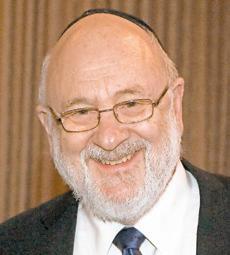
He was an old man, and in many ways came from a very different world than I. And yet he taught me more than anyone else ever did. One of the things he taught me was that no one suffers as much as a parent who loses a child.
He delivered this lesson to me on a wintry day more than 50 years ago. He was my grandfather, my father’s father, and the family had just broken the news to him that his youngest grandchild, my baby cousin, had died. It was a sudden death, totally unexpected, and everyone was distraught. Grandpa too took the news very hard.
He then did something which surprised everyone present. He rose to leave the room, beckoning to me — his oldest grandchild, then 14 — to accompany him. We both entered a small adjoining room in which there were
a few sacred books, including a siddur. He opened the siddur, read from it for several moments, and then looked up to me, and tearfully whispered:
“There is nothing worse in the world than the death of one’s own child. A parent never recovers from such a blow. May the merciful G-d protect us all from such a fate.”
I will never forget those words. I remember them verbatim even today. And a lifetime of experience in the vocation of counseling has confirmed the truth of these words over and over again.
In this week’s Torah portion, Parshat Shemini, we read of just such a tragedy. On a bright and sunny spring day, somewhere in the Sinai wilderness, the Tabernacle is being inaugurated. It is an awesome spiritual experience in which “a divine fire descends from on high, in which all the people sing in unison, and fall upon their faces.”
It is the moment of a peak experience, for all the people, but especially for Aaron, the High Priest. At that very moment, his two elder sons, Nadav and Avihu, step forward and commit a sacrilegious act which dispels the
Aaron remained silent about his grief for the rest of his life.
mood and ruins the entire experience.
Commentators differ widely as to exactly what was the sin of these two sons of Aaron. Scripture just says that “they offered G-d a strange fire, something He did not command of them.”
G-d’s wrath was expressed instantly. “A fire descended from before Him and consumed them, and they died in the presence of G-d.”
A father lost two children. Not through a long and debilitating illness but suddenly, unexpectedly. And not in any ordinary set of circumstances, but in the context of an act of sacred worship.
What is Aaron’s reaction? Does he moan and groan and rend his clothing? Does he scream out in grief? Or does he vent his anger against the G-d who took his boys from him?
None of the above.
“Vayidom Aharon.” Aaron is silent. Slence of shock? Perhaps. Silence of acceptance of fate? Or, perhaps, the silence which results when the range and depth of one’s emotions are too overwhelming to express in words.
If the sage words that my grandfather shared with me in my early adolescence are true, and I have every reason to believe that they are, Aaron remained silent about his grief for the rest of his life. Had he used the words of his ancestor Jacob, he could have said “I will go down to the grave in my agony.”
Soon after this episode in which my grandfather shared his wisdom with me I had the occasion to read a book which taught me a bit more about a grieving parent. The book, “Death Be Not Proud” by John Gunther, was assigned in my English Literature class.
I somehow doubt that this book is still on the required reading lists of many tenth graders today, but I certainly recommend that it be read, particularly by teenagers who are learning their first lessons about life and its tragic disappointments. See Weinreb on page 22
For Aharon, a silence that every parent dreads Kashrut: A pause to weigh our spiritual selves
From Heart of Jerusalem Rabbi biNNY FREEDMaN Jewish Star columnist

Years ago, I had the opportunity to take a long-overdue vacation with my family in Walt Disney World. For our children, who had just spent the better part of a year dealing with the day-to-day challenges of living in Israel post-Oslo, and especially watching their father constantly in and out of the army reserves, Disney must have seemed like a fantasy world, and I was curious to see how they would respond to the educational challenges it would present.
At the end of our first fun-filled day, as we were making our way out of the park, and we passed through the shops and gift stores strategically situated at the exit. I am sure many a parent, anxious to get back to their hotel rooms after a long day on their feet, succumbs to their children’s desires for one last treat. My children were no different, and as we neared the park (and candy store) exit, they grabbed candy bars and lollipops off the easy-access racks, with
eyes full of pleading for one last treat at the end of the day.
I noticed a girl behind the cash register smiling as she eyed the familiar sight of a parent debating whether to allow one last indulgence in order to avoid the battle of wills that would ensue if I had other ideas about my children’s desire to fund our local dentist.
However, glancing quickly at the various treats in my kids’ eager hands, it was quite obvious that none of the candies and treats had any seal of kashrut (thank G-d!), and I promptly told my children that the candies weren’t kosher, at which point they put all the candy back on the racks. I didn’t really think much of this little scene until I looked up and saw the shocked look on the face of the cashier.
“What did you just tell them?” she asked.
She was looking with particular disbelief at our then four-year-old Adi, who had immediately deposited her “horde” of sweets back into the rack. “What do you mean?” I asked.
To which she responded: “Every day, I watch hundreds of parents either give in or do battle with their children over whether or not to buy the candies that they want. You wouldn’t believe some of the shouting and crying matches
that take place here at the end of the day. In fact, we sometimes get letters asking us to move these racks for that very reason. But in the entire year I have been working this shift I have never seen children so calmly place the candy back on the racks, so I was wondering what you told them that made them all change their minds?”
At which point I explained: “We are Jewish, and I told them this candy isn’t kosher.” Adding: “And please don’t tell the park to put kosher candy here!”
For me, the entire Disney experience was worth it for that one moment. I had never considered what an extraordinary vehicle kashrut is in teaching children the value of self-restraint. Yet, this does not really resolve some of the many challenging questions that arise regarding the concept of kashrut in general, and kosher food in particular.
This week’s portion, Shemini, contains one of the most central mitzvoth in Jewish life, the mitzvah of kashrut.
Speak to the children of Israel saying: These are the creatures that you may eat from among all the animals that are on the earth: Every animal that has a split hoof and chews and brings
up its cud, that (is the animal) you may eat. (Leviticus 11:2-3)
Specifically, Torah shares what we can and cannot eat — which fish, birds and animals are parts of a Jewish lifestyle, and which are anathemas to it. All of which begs the question: why are we so concerned with what we eat? Would we not be better served focusing on what comes out of our mouths, and worrying less about what goes into them? Why is kashrut so important?
Why are some animals, such as lions and tigers and bears rendered unkosher, whereas others, such as cows and sheep and deer, are considered kosher for eating? And why, for an animal to be considered a kosher animal, must it chew its cud; how does eating animals that literally eat their own regurgitation make us, somehow, a “holier people” (Vayikra 11:45)? And what is so special about split hooves?
Dayan Grunfeld, in the introduction to his “The Dietary Laws,” suggests that one of the challenges we face as human beings is the constant tension between the physical and spiritual aspects of who we are.
There is one reminder that in the end we are still physical, limited beings. As the specter of
See
Answering questions from children of tomorrow
alaN JaY GERbER Jewish Star columnist

Here we are, on the cusp of the holiday of Pesach that in every manner of theme and observance surely defines us as a people.
To help us prepare to respond to our children who may questions the Expodus experience, I am presenting excerpts from “The Inside Story — Exodus” (Meaningful Life Center, 2017), by Rabbi Yanki Tauber of Woodmere.
t he Festival of the Child
And you shall tell your son on that day: “This is done because of what G-d did for me, when I came out of Egypt” (Exodus 13:8).
When did you last experience freedom? For many of us, burdened by our jobs, our familial and social responsibilities, and the other entanglements of the human conditions, freedom seems as rare as it is essential, as elusive as it desirable. We want it, we need it, yet how do we achieve it?
But look at the child. Observe him at play, immersed in a book, asleep and smiling at his dreams. Assured that father and mother will feed her, protect her and worry about all that needs worrying about, the child is free. Free to revel in his or her inner self, free to grow and develop, open to the joys and possibilities of life.

This is why Passover, the festival of freedom, is so much the festival of the child. For it is the child who evokes in us the realization that we, too, are children of G-d, and are thus inherently and eternally free. It is the child who opens our eyes to the ultimate significance of Passover: that in taking us out of Egypt
to make us His chosen people, G-d has liberated us of all enslavement and subjugation for all time. …
As different as they may be, the “four children” of the Haggadah have one thing in common: whether involved, challenging, inept, or indifferent, they are all present at the Seder table. They are all relating, albeit in vastly differing ways, to our annual reliving of the Exodus and our birth as a nation. The line of communication is open; the potential “wise child” that resides within every Jewish child is approachable.
Today, however, in our era of spiritual displacement, there also exists a fifth child: the Jew who is absent from the Seder table. He or she asks no questions, poses no challenges, displays no interest. For she knows nothing of the Seder, nothing of the significance of the Exodus, nothing of the revelation at Sinai at which we assumed our mission and role as Jews. To these children of G-d we must devote ourselves long before the first night of Passover. … tomorrow’s Child
“It shall come to pass that your child will ask you, tomorrow, to say: ‘What is this?’ You shall say

THE JEWISH STAR April 5, 2024 • 26 Adar II 5784 17
Kosher bookworm
See Gerber on page 22
Tauber.
Freedman on page 22 Rabbi Yanki
Jewish Star Associate: Nechama Bluth, 516-622-7461 ext 241.
Content: The Publisher endeavors to ensure that this newspaper’s content is within the bounds of normative halachah and hashkafah. Any reader who feels anything we publish may be inappropriate in this regard is urged to bring the item in question to the attention of the Publisher.
Advertising is accepted at the sole discretion of the Publisher. The Publisher expects all advertising to conform to standards of content appropriate for distribution in an Orthodox community.
Send us your news! News@TheJewishStar.com
Advertising: Publisher@TheJewishStar.com
Kashrut: The Jewish Star is not responsible for the kashrut of any product or establishment featured in its pages. If you have questions regarding any establishment or product, including its supervision, please consult your rabbi for guidance.
Submissions: All submissions become the property of The Jewish Star and may be edited and used by the Publisher, its licensees and affiliates, in print, on the web and/or in any media that now exists or will exist in the future in any form, including derivative works, throughout the world in perpetuity, without additional
Opinions: Views expressed by columnists and other writers do not necessarily reflect the position of the Publisher or of The Jewish Star LLC.
Distribution: The Jewish Star is available free in kosher food establishments, stores, synagogues, and curb-side newsboxes on Long Island, in New York City and elsewhere. To request free delivery to your location, write Publisher@TheJewishStar.com.
Pogrom photogs deserve censure, not awards

What is the obligation of a reporter or news photographer covering an act of terrorism or warfare? Is it merely to document what has happened? Or are there some limits on what a journalist should do to get a story or an image? How does a working journalist balance the public’s right to know and the need to document moments that may well be considered part of the first draft of history — as writers self-importantly like to refer to their work — against other considerations?
The line between being a proverbial fly on a wall observing events in which the reporter/ photographer is not an actor as opposed to active participation in them can be razor-thin at times. And there are plenty of times when that line isn’t easy to discern.
But in the case of the freelance photographers in Gaza who went along for the ride with Hamas on Oct. 7, the notion that the product of their day’s work should be viewed as simply normal reportage is a perversion of any notion of honest or ethical journalism.
The potential complicity of those photographers and the mainstream outlets such as Reuters, the New York Times and the Associated Press that ran their pictures of the atrocities committed by the Palestinians was the subject of a firestorm of protest after HonestReporting’s study on the subject was published.
Riding with murderers
Those publications denied that they had any prior knowledge of the Hamas attacks, as did the photographers. They claimed that they merely followed the crowd of terrorists and ordinary Palestinians who crossed the border to take part in an orgy of murder, rape, torture, kidnapping and wanton destruction in the 22 Jewish communities that were attacked that day before Israeli forces began their counterattack.
The issue has returned to the news with the announcement that the University of Missouri’s Donald W. Reynolds Journalism Institute has
given its prestigious “Photo of the Year” award to the image taken by Ali Mahmud. In it, some Hamas terrorists are shown sitting in the back of a pickup truck brandishing weapons and showing off the half-naked body of 22-year-old Shani Louk, a German-Israeli artist who was attending the Nova music festival that was attacked by a horde of heavily armed Palestinians.
It’s not known for sure whether Louk was still alive when the photo was taken. Initially, there were reports that she was seen, albeit in grave condition, inside Gaza. But Israeli forces subsequently found a bone from the base of her skull on a road leading out of the festival grounds, which means that she has officially been declared dead. But whether she was dead or dying, the photo depicts the terrorists displaying her body as a trophy during their triumphant return to Gaza amid the cheers of Palestinians who then, and now, according to multiple surveys, supported the atrocities of Oct 7.
To add further insult to injury, the caption on the award — itself a biased document that underestimates the number of Israelis kidnapped and accepts the widely exaggerated and bogus Hamas statistics about Palestinian casualties — doesn’t even mention Louk. To the AP, the University of Missouri and the Reynolds Institute, she was merely a prop to be displayed by her murderers, not even worthy of being named.
The award has renewed the torrent of anger from Israelis, Jews and anyone with a shred of decency about the conduct of these specific photographers and the use of their work by respected news outlets.
Deserving of contempt
As English historian Simon Sebag Montefiore wrote on X, the award seems like “a sinister and creepy joke.”
As he further noted, the AP deserves our contempt “for using the product of a ghoul who rode with terrorists and rapists as they slaughtered women and children, and then stopped to pose and snap this vision of heartless, diabolic triumph: the killers and abusers of an innocent girl pose with her naked broken body as a trophy.”
That this outrage should be honored suggests, he said, that the awarding bodies “have deep fissures of emptiness where their morality, humanity and indeed taste should be.”
The prestigious honor given to the photo of Hamas terrorists showing off the half-naked body of their young Jewish victim is evidence of the corruption of contemporary journalism.

What the AP, which happily accepted the award, and those who gave it to them are doing is “celebrating the posing of a picture snapped between the capture, rape and killing then gleeful parading of the naked body of an innocent girl in the middle of a process of unspeakable mutilation and mockery, the very photographing itself an act of indefensible abuse and atrocious inhumanity. Not to speak of an appalling corruption of the ethics of journalism.”
But not everyone is angered by it.
Louk’s father, Nissim Louk, has been quoted as saying he was pleased by the award because it preserves a moment that should be remembered, albeit with infamy, and is therefore one of the most important photos of the last 50 years. While he has a point about the importance of what happened on Oct. 7, I think he fails to grasp that the award is being given not so much to a brilliant example of photographic composition — which it wasn’t — but to the photographer for being there even though no decent person should have been in a position to take it. Rather than a memorialization of depravity, it is a celebration of it.
Ron Kampeas, the Washington Bureau Chief of the Jewish Telegraphic Agency, also defended the award, writing that “reporters and photographers who take risks to expose atrocities deserve recognition … because they take risks to expose atrocities. Because we should have
evidence of atrocities. I don’t get how anyone who has anything to do with reporting does not get this.”
Perhaps in the current culture of journalism, many who work in the liberal corporate press agree with Kampeas. But his comment doesn’t stand up to scrutiny.
Those who joined in the orgy of atrocities on Oct. 7 were not taking risks. At best, and if you accept their claim that they had no foreknowledge of what would happen that day, they were merely joining a bloodthirsty mob carrying out pogroms. And given that those carrying out these crimes were themselves taking photos and videos with Go-Pro cameras given to them by Hamas, the notion that we needed these photos to provide evidence of these events is risible.
If anything, the photographers were seeking to celebrate these crimes in much the same manner that many Nazis took pictures of Jewish men, women and children they murdered during the Holocaust.
Ethical violations
This doesn’t merely normalize that which shouldn’t be normalized. It is, as Montefiore wrote, a violation of the ethics of journalism. Indeed, the conduct of the photographers that went along with Hamas violated numerous pro-
April 5, 2024 • 26 Adar II 5784 THE JEWISH STAR 18
Shani Louk, an Israeli-German citizen murdered by Hamas on Oct. 7. Courtesy Nissim Louk
Published weekly except during certain religious and civil holidays by The Jewish Star LLC New York City office: 5676 Riverdale Ave Suite 311, Bronx NY 10471 • LI office: 2 Endo Blvd, Garden City NY 11530 TheJewishStar.com Ed Weintrob, Editor and Publisher
• 516-622-7461 ext 291
Trusted Jewish Newspaper. Honest Reporting. Torah-True. Kosher and Fat-Free.
• EWeintrob@TheJewishStar.com
NY’s
authorization or compensation. The individual or entity submitting material affirms that it holds the copyright or otherwise has the right to authorize its use in accordance with The Jewish Star’s terms for submissions.
Copyright: All content is copyright and may not be republished or otherwise reproduced without written permission by The Jewish Star LLC; to do so without permission is against the law and halacha. For content reproduction write to Publisher@TheJewishStar.com. The Jewish Star subscribes to the JNS news service. It, or its contributors, own the copyrights on material attributed to them. The length and content of JNS material and all other submitted material may be edited by The Jewish Star. This newspaper contains words of Torah; please dispose of properly. See Tobin on page 22
Editor-in-Chief
JONATHAN S. TObiN JNS
Reminder: Beware the Ides of March (redux)
THANE ROSENBAUM Distinguished University Professor Touro College
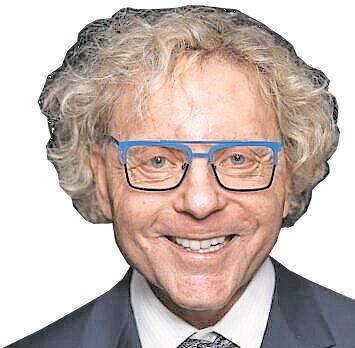
Beware the Ides of March. Not that Ides! This past Ides of March — give or take a few days.
The infamy of that earlier Ides lives on, 2,068 years later, with a similar drama of betrayal, and one not without biblical significance. Today, however, it’s not Julius Caesar asking, “Et tu, Brute?” but the nation-state of Israel, a large knife lodged in its back, wondering, “Et tu, Biden?”
Yes: President Joe Biden, perhaps fearing the fate that dethroned Caesar, decided that he must throw Israel under a chariot to remain in the Oval Office. The United States failed to veto a UN Security Council Resolution calling for a temporary ceasefire in Gaza and the release of “some” (why not all?) of the Israeli hostages. Oh, and the resolution somehow never got around to rebuking Hamas.
The vote was 14 countries in favor, with only
Not unlike Julius Caesar, Israel received a number of stabbings over the past few weeks, none of which, fortunately, have been fatal.
one abstention — the United States. The world certainly is loath to condemn Hamas. Insulting Islamic maniacs is so yesterday’s diplomacy. And it risks having terrorists set off bombs or take hostages — when they’re not beheading babies and raping the corpses of Israeli teenagers. (The Taliban announced this week that the stoning of women will resume in Afghanistan.)
Can anyone believe we’re even having these discussions? The world actually tolerates this barbarism. These global rallies aren’t even proPalestinian — they are pro-Hamas!
The combined forces of Sen. Bernie Sanders of Vermont, the Squad and the Congressional Black Congress, along with voters in Dearborn and Minneapolis, apparently are running the table for the Democratic Party. The same people who have made life miserable for hundreds of millions of Arabs and Muslims in the Middle East and Persian Gulf have overtaken city streets (and bridges, train stations and town halls) near you.
So President Biden sent a message to Israel’s enemies that he, too, knows how to bash the Jewish state. He went one step further: withholding some weapons that Israel requested. The Chairman of the Joint Chiefs of Staff reported that while some of Israel’s request was rejected due to unavailability, in other instances, what Israel needs “we’re not willing to provide right now.”
Biden had good training for such betrayal of a democratic ally. Back when he was vice president, during the final days of the Obama presidency, the United States abstained on UN Security Council Resolution 2334, which charged that all Israeli settlements, along with Israel’s presence in eastern Jerusalem and the Western Wall, are illegal. That’s right: a return to the indefensible borders that existed before the SixDay War.
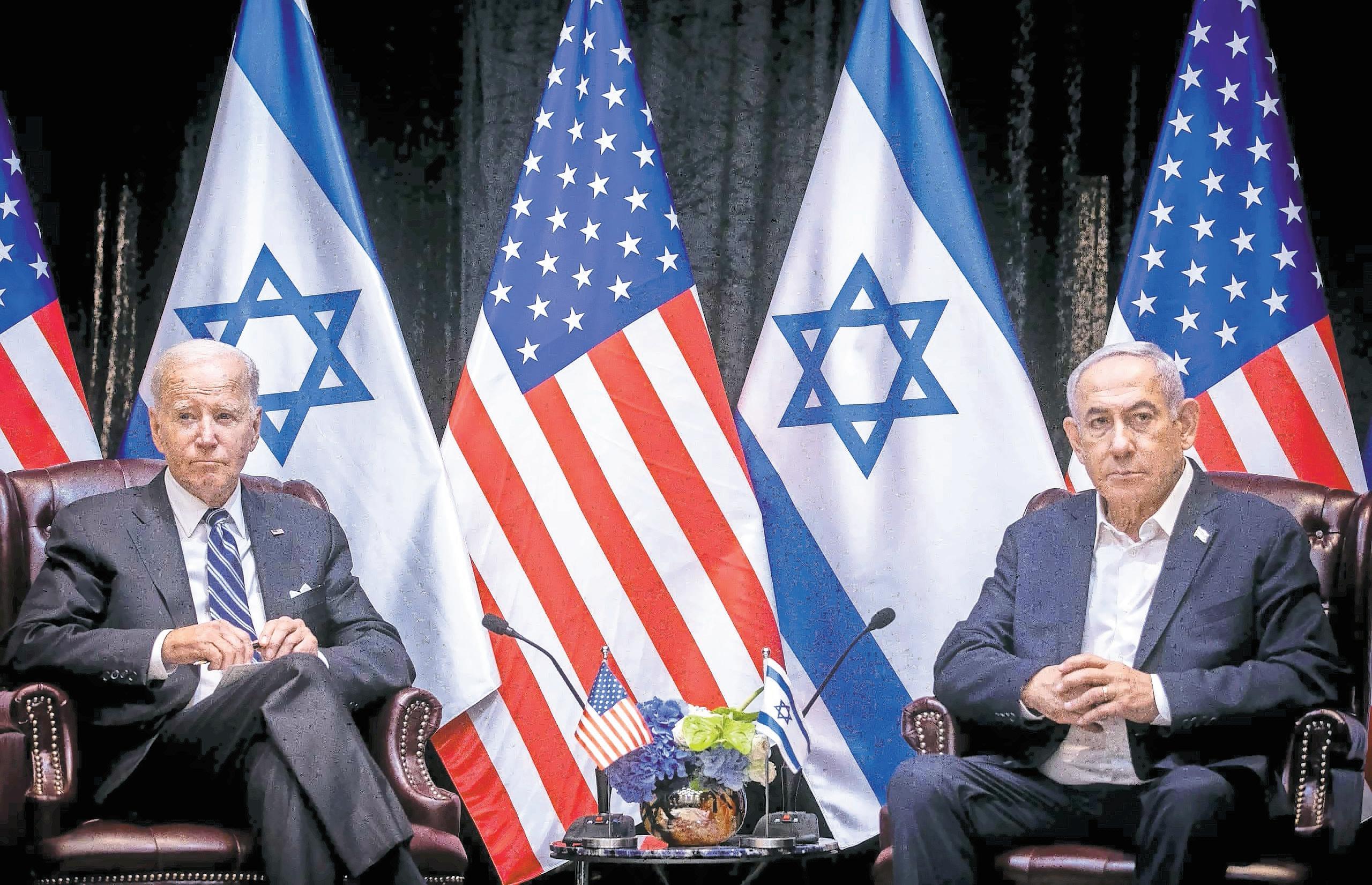
Some people have never forgotten Obama’s parting shot. (I haven’t.) Up until that point, the United States consistently vetoed the many resolutions that have condemned Israel since 1948 — usually a multiple of the condemnations against all the other nations combined. Yes, we’re talking about Syria, Iran, China, North Korea and Russia — all deemed citadels of human rights compared to Israel.
That these were one-sided, antisemitic screeds is why the United States nearly always exercised its moral leadership by vetoing them — killing them before they gained any symbolic
currency. But not last week. Biden was too busy giving comfort to terrorists and courting the vote of people who hate America.
Nice judgment, Joe.
Of course, the Biden administration didn’t seem to grasp why Israel’s supporters were alarmed. The vote represented no change in official policy, they maintained. “We didn’t actually vote for the temporary ceasefire! We just stood on the sidelines and watched the other 14 countries gang up on the Jews.”
There is no excuse for abstaining when the
See Rosenbaum on page 22
Germany’s new naturalization test a bit too late
BEN COHEN

What do you call a Jewish house of prayer?
When was the State of Israel founded?
Which cities in our country have the largest Jewish communities?
These are just three of the 20 questions about Israel and Jewish life that Germany will be introducing into its naturalization test for prospective citizens. Announcing the changes last week, German Interior Minister Nancy Faeser said their purpose was to root out and exclude the bigots.
“Anyone who does not share our values cannot obtain a German passport. We have drawn a crystal-clear red line here,” she stated. “Antisemitism, racism and other forms of contempt for humanity rule out naturalization.”
Some of the additional questions are more philosophical in nature and deliberately so. For example, the question “What is the basis of Germany’s special responsibility to Israel?” carries four possible answers: “membership of the EU,” “Germany’s Basic Law,” “the Christian tradition” and the correct response, “from the crimes of National Socialism.” That, of course, underlines the
My examining officer, noticing my very Jewish name, was apologetic and a little embarrassed when she asked me if I was or had ever been a Nazi.

centrality of the Nazi Holocaust to postwar Germany’s commitment to a democratic order.
Similarly, the question “On what legal basis was the State of Israel founded” includes the options “by a resolution of the Zionist Congress,” “a proposal by the German government,” “a proposal by the USSR” and the correct answer, “a resolution of the United Nations.” That emphasizes, rightly, that Israel’s sovereign legitimacy was recognized by the world’s leading international organization.
Another question, “Who can join the Jewish Maccabi sports clubs?” includes the options “only Germans,” “only Israelis,” “only religious people” and the correct answer, “everyone.” The point here, which escaped the Washington Post’s reporter on the story, who called this question “mysterious,” is to puncture the antisemitic myth that Jews only look out for other Jews and only
provide services to other Jews.
Generally, I think naturalization tests for immigrants are a good idea. When I became an American citizen seven years ago, I remember some of my native-born American friends joking that I likely knew more about the United States than most Americans because you have to study up on the answers to questions like, “How many judges sit on the Supreme Court?” and “Why was the Civil War fought?”
And in the US naturalization test, you are also asked about political affiliations — my examining officer, noticing my very Jewish name, was apologetic and a little embarrassed when she asked me if I was or had ever been a Nazi, but anyone who admitted as much, or indeed to having been a Communist, would be rather unlikely to pass. In that sense, there is a trustworthy precedent for what the Germans are introducing now.
The larger consideration is how effective such a test might be. You don’t have to be particularly bright to memorize answers like “synagogue,” “1948” and “1,700 years ago” — the correct answer to the question, “When was the first Jewish community in Germany established?”
So, if you’re a hardened antisemite who wants a German passport, you have the option of acquiescing to this distasteful test in the name of a higher purpose. No doubt, there will be many prospective immigrants who will try just that.
However, just because the test can’t guarantee that antisemites won’t slip through the net doesn’t mean that the proposal is faulty. The test’s purpose is to project, gently but firmly, Germany’s core values and the need for prospective citizens to conform to those values. And if you can’t or won’t do so, the message essentially says, then you are free not to come here in the first place.
The test is also an acknowledgment that antisemitism can be imported. For much of the postwar period, antisemitism in Germany was mainly a problem on the far right; however, with the explosion of political violence in the 1960s and 1970s, it became a problem on the far left as well.
But during the last 20 years — and particularly with the arrival of around 2 million immigrants from the Middle East in 2015, as civil war raged in Syria — the problem has taken a distinctly Islamist turn. In the weeks since the Hamas pogrom of Oct. 7, Germany has witnessed up to 29 antisemitic incidents per day, many of them executed by Arab or Turkish-origin immigrants.
Not all the incidents involve violence — indeed, most of them concern vandalism and the spread of ugly antisemitic propaganda online and at demonstrations — but there is little doubt that whatever the nature of the offense, the German authorities want to minimize the amount of antisemitism in their midst.
To my mind, there’s another deeper question
THE JEWISH STAR April 5, 2024 • 26 Adar II 5784 19
President Joe Biden and Israeli Prime Minister Benjamin Netanyahu speak to reporters in Tel Aviv, Oct. 18, 2023. Miriam Alster, Flash90
Global Focus
See Cohen on page 22
Proudly Jewish.

Proudly Zionist.
Proudly American.
April 5, 2024 • 26 Adar II 5784 THE JEWISH STAR 20 1216059
Joe Lieberman: Proud, vocal and committed Jew

The words that come to me as I absorb with great sadness the sudden passing of Joseph Lieberman, of blessed memory, are from the verses describing his namesake, Joseph in ancient Egypt: How all who encountered him, from the top echelons of government to those imprisoned in its dungeons, could see that “G-d was with him; and everything he did, G-d made succeed in his hand” (Genesis 39:3).
As Pharaoh himself said, on appointing Joseph the prime minister of Egypt, “Could we find another like him — a man who has the spirit of Go-d within him. … There is no one as insightful and wise” (Genesis 41:38-39).
Like Joseph in ancient Egypt, as a US senator, Lieberman held high office in a global superpower, succeeding in everything he did and
‘Sabbath observance is a gift that has anchored, shaped and inspired my life.’
enjoying Divine blessings. G-d’s ambassador for the Torah’s noblest attributes — humility, wisdom, integrity and compassion — he was the ultimate Kiddush Hashem, sanctifying the Divine name in the world, carrying it with befitting dignity and grace.
Lieberman was a public servant in the truest sense, living, as our sages describe, “for the sake of Heaven.” His memoir, “In Praise of Public Life,” is a tribute to the idea of politics for a higher purpose. The book is about the importance of making a difference; of getting involved in public life in order to make the world a better place.
He writes, paraphrasing Pirkei Avot: “The day is short … and there is much work to be done — tikkun olam, repairing our government and improving our beloved country and world. We are not required to complete the work ourselves, but, as good and grateful citizens, we cannot withdraw from it either.”
The senator was a man of principle. He was the first national Democrat to publicly criticize President Bill Clinton for his infidelity, drawing the anger of his party and risking his political career. And yet, the following year, Al Gore — vice president under Clinton — turned to Lieberman to join the ticket for the 2000 presidential election, making him the first Jewish candidate on a major-party ticket for the White House.
But Lieberman wasn’t just Jewish by birth — he was a proud, vocal Jew, unreserved and totally committed to his Judaism. In the heat of the campaign, he made it publicly known that he would not be campaigning on Shabbat.

Joe Lieberman…
Continued from page 1
Born in Stamford, Connecticut, on Feb. 24, 1942, Lieberman studied political science and economics at Yale University — the first in his family to attend college.
After graduating from Yale Law School in the late 1960s, Lieberman joined a law firm in New Haven, Connecticut.
He was first elected to that state’s senate in 1970, where he later became majority leader. However, the Republican landslide that came with the election of Ronald Reagan as president in 1980 swept him and other Democrats out of office.
Lieberman was elected attorney general in Connecticut three years later, serving there until he was elected to the US Senate in 1988. He would lose a primary battle to Ned Lamont in 2006, prompting Lieberman to make an independent bid to keep his seat — and he succeeded with 50 percent of the vote.
Lieberman retired from the senate in early 2013, moving to Riverdale soon after, but staying close to politics. He had even been considered a top-pick by President Donald Trump to replace James Comey as FBI director in 2017. Joseph Lieberman is survived by his wife, Hadassah, and his three children. His final resting place is at Congregation Agudath Sholom in Stamford, a synagogue the Lieberman family were longtime members of.

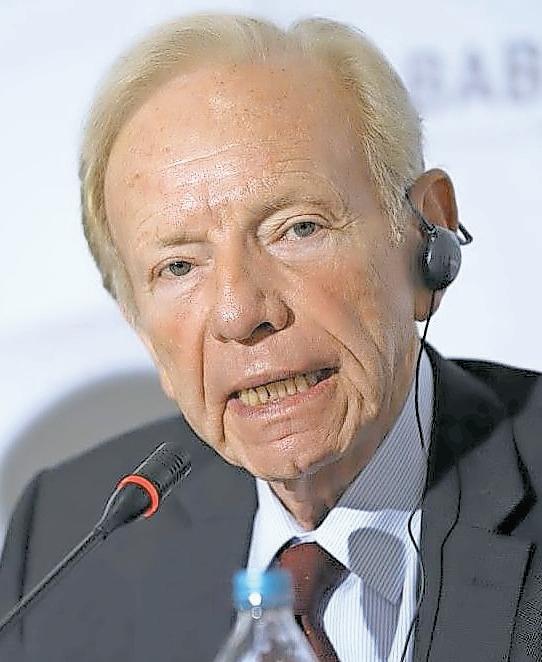
As renowned political commentator Charles Krauthammer put it, “Jews in American public life are old news; Orthodox Jews are not. … Which is why Lieberman’s entry onto the national stage is so significant. It not only confirms and ratifies the full entry of Jews into the higher councils of American life. It marks the entry of Judaism into the deeper recesses of
the American consciousness.”
And at the heart of the senator’s own Jewish consciousness was Shabbat. In the opening pages of the “Gift of Rest” — the title of his book on the subject — he describes how delayed by an important vote at the Senate, he had to walk home one Friday night in the rain:
“It’s Friday night and it’s one of those torrential downpours that we get in Washington, DC, and I’m walking from the Capitol to my home in Georgetown getting absolutely soaked—the United States Capitol policemen at my side as we make our way up Pennsylvania Avenue from the Capitol building towards our distant goal, a fourand-a-half-mile walk. But I do not — indeed, I cannot — accept a ride in the car.”
Reflecting on this symbolic moment he wrote, “Sabbath observance is a gift that has anchored, shaped and inspired my life.”
It was through Lieberman’s passion for Shabbat that I got to know him personally. We shared a vision of spreading Shabbat in the world. He kindly joined the International Advisory Board of The Shabbat Project, giving so generously of his time and effort, and sharing his connections and wisdom. He was a cherished advisor and mentor, and his gentle warmth and friendship meant the world to me. I will miss him dearly.
Our world is dimmer without Sen. Joseph Lieberman. Let us illuminate it by living the values he personified — sharing the light of Shabbat, dignity, decency and faith in our world.
May his memory be a blessing, like his beloved Shabbat, “the source of all blessing.”
Tributes to Lieberman at funeral in Stamford
By Andrew Bernard, JNS and Eric Harvey, Riverdale Press
Mourners at Joe Lieberman’s funeral on Friday at Congregation Agudath Sholom in Stamford included Al Gore, who chose Lieberman was his vice-presidential running mate in 2000; current Connecticut Senators Richard Blumenthal and Chris Murphy, and former senator Chris Dodd, as well as Gov. Ned Lamont, who defeated Lieberman in a bitter 2006 Democratic Senate primary before losing to him in the general election.
Despite their differences over the Iraq war (Lieberman stood out among Democrats for his support), Lamont said he had grown to have an enormous respect for Lieberman’s integrity and faith.
Dodd, who represented Connecticut in the Senate alongside Lieberman for 22 years, said he and Lieberman divided their respective Sabbath calendars to continue meeting with constituents.
“Joe Lieberman recommended that I should be responsible for all community events from sundown Friday to sundown Saturday,” Dodd said. “In short, I became his Shabbos goy.”
“On the other hand, Joe would assume all the similar responsibilities for me on Sundays,” he said, joking that “one day I did the math — the Shabbos goy was responsible for 24 hours, and the new altar boy, Joe Lieberman, was on duty for four or five hours on Sunday.”
All of the speakers said Lieberman had a rare devotion to faith, family and public service, as well as a decency that he extended to those he knew best and those he barely knew.
Gore addressed the falling out that he and Lieberman had had over the Iraq War, which led Gore to endorse Howard Dean over Lieberman in the 2004 presidential primary.
“Joe and I went our separate ways after 2000,” Gore said. “I, for one, was tempted to anger at times, frustrated at Joe’s stubbornness and disappointed that he was taking a path that I thought was wrong. I know his disappointment in my turning away from him was surely just as profound.”
“Here the story could have ended,” Gore recounted. “If it had, we would have reached a dead end in a once loving and fruitful friendship.
“But it did not end there. We had another turn. Both of us knew deep down that the strong foundation of our friendship, and what we shared in common, was so much larger and so much stronger than what was driving us apart in those years.”
“Joe had that wisdom,” he said.
Lieberman was an active member of the Riverdale Jewish Center with his wife, Hadassah, and had grandchildren at the SAR schools.
“He was just a humble beloved member on a regular day or regular Shabbat,” said RJC Rabbi Dovid Zirkind. “He was everybody’s friend in shul.”
SAR Academy Principal Rabbi Binyamin Krauss described Lieberman as a champion of Israel.
“We consider ourselves a Modern Orthodox school, which is basically about being committed to observance, committed to our heritage, and engaged in the world,” Rabbi Krauss said. “And for many people, Joe Lieberman was the model of that. And I think, for a lot of kids and our families, that is something we aspire to.”
When thinking about a memorable moment he shared with Lieberman, SAR President Jack Bendheim recalled a pair of socks.
“I was with him someplace in DC in a hotel, and all of a sudden I noticed he took out of his pocket a pair of socks,” Bendheim said. “And I said, ‘What are you doing?’ He said he had learned from an old political guy in Connecticut that the best way to sort of reawaken after a long day of standing on your feet and campaigning was putting on a new pair of socks.
“When he got the nomination as vice president, we were in Los Angeles. I went out and bought him two dozen pairs of socks.”
“Daddy, as I approached Riverdale on Wednesday evening, I expected you and mommy to be waiting in the lobby of your apartment building with a smile on your face helping me schlep the stroller and bags with the energy of a 65-yearold and not an 82-year-old,” his daughter Hani told the funeral gathering. “But Hashem had others plans. G-d had other plans. This is what G-d wanted, and although you were 82, we all feel you were ripped away from us at a much younger age.”
THE JEWISH STAR April 5, 2024 • 26 Adar II 5784 21
Illinois senator Barack Obama in that race.
Joe Lieberman discusses the Babyin Yar Holocaust Memorial Center in Kyiv in 2017.
Krysja, Shutterstock
Al Gore at Joe Lieberman’s funeral. Screenshot via JNS
Joe Lieberman’s daughter, Hani Lowenstein, speaks at his funeral.
Eric Harvey, Riverdale Press
Rabbi WaRRen Goldstein
South Africa’s chief rabbi
Weinreb…
Continued from page 17
In the book, the author describes his own son, who was taken from him by a vicious disease. He describes his son positively, but realistically. And he rages against the disease, and in some way, the Divine being who took his son from him. He insists to Death itself that it be not proud about its victory over its victim, his dear child.
It has been decades since I read Gunther’s book, and it could very well be that I do not remember it with complete accuracy. But I recall the poignancy and the power with which the author conveyed the full range of his painful emotions. And I will never forget those passages in which he insists that he will never recover from his loss, that the wounds of a parent’s grief for his child can never heal.
Many are the lessons which students of Bible and Talmud have derived from the sad narrative contained in this week’s Torah portion. But there is at least one lesson which every empathic reader will surely learn as he or she attends to the opening verses of Leviticus 10.
It is the lesson contained in the mystery of Aaron’s reaction when his sons are consumed by a heavenly fire. For within the deafening silence of “Vayidom Aharon” are the depths of the terror which every parent dreads, and some parents have suffered. The dread of bereavement, of the loss of one’s child.
As always, in contemplating darkness, light stands out in contrast. Reflection upon death leads to an appreciation of life. The story of the death of Aaron’s children should, if nothing else, enable us to appreciate all the more those of our children who are alive and well.
As we embark upon this spring season, with all the springtime symbols in the way of life and renewal, let us celebrate and appreciate all of our own offspring, may they live and be well.
Freedman…
Continued from page 17
death approaches, there is the danger of considering that if, in the end, we are here today and gone tomorrow, then what is the point? Why not just “eat, live, and be merry, for tomorrow we die”?
Every time we come into contact with death, the Torah has us pause and consider the implications.
Meat, in the end, represents death, not only because an animal has to die for us to eat it, but also because the flesh is such a strong physical symbol of our own mortality. If we are going to eat meat, at least, suggests the Torah, we should consider carefully what sort of meat we do eat.
Jews do not eat carnivorous animals, either because on a mystical level we are better off not taking into ourselves the energy of animals that kill other animals (a much more intense contact with death) or because by choosing to eat only herbivorous animals we have the opportunity to struggle with the moral messages that are the basis for this decision.
Rabbi Shimshon Raphael Hirsch suggests this may be the reason one of the signs of a kosher animal is it chews its cud, which is the mark of a more complex digestive system, itself necessary to allow an animal to eat and digest an herbal diet. (It is much easier, and indeed more “base” for animals, including ourselves, to digest meat.)
And, some zoologists have suggested, the hoof least likely to be used as a weapon (the mark of a carnivore) is the cloven hoof.
As for the mixing of milk and meat, (a topic that could be its own class), it is worth noting that while meat in the Torah represents death and cruelty (as with Eisav, who is the man of the hunt and is the epitome of cruelty and destruction in the Torah), milk represents mercy and life. Indeed the image of the babe suckling at the mother’s breast is the literary and biblical example of mercy.
We live in a world where man is everything, and we have the power to create and destroy on levels previously not even imaginable. It be-
hooves us to remember that while we may have clear ideas of what is right and what is wrong, sometimes what we perceive to be kind may really be cruel, and what we deem to be cruel may really be kind.
Each time we sit down to a meal, or choose to wait a few hours before eating dairy products, we have the enormous opportunity to consider these questions and ideas.
And each time we succeed in making this a part of our everyday experience we allow ourselves, on some small level, the gift of becoming better and more sensitive human beings, which of course is the goal of the entire process.
May we all be blessed to be partners in transforming the world we live in, which has seen so much cruelty, into a place of love and kindness, joy and peace, one day at a time until we can all partake of that magnificent barbecue in Jerusalem, one day soon. (A guy can dream, right?)
Gerber…
Continued from page 17
to him: ‘With a mighty hand, Gd took us out of Egypt’.”
On the most basic level, Rashi explains the plain meaning of the verse [“there is a tomorrow that is immediate, and there is a tomorrow that is a long way off”].
The child who will observe the Passover rituals and asks, “What is this?” is obviously not the child of an immediate tomorrow. Such a child would have witnessed the miracles of the Exodus themselves, and would have firsthand knowledge of the significance of these mitzvot
So the “tomorrow” of which the Torah speaks is of a more distant time and generation — a generation for whom the liberation from Egyptian slavery is a long-ago “historical event,” and who need to be educated on its relevance to their lives. …
There are children who are of an immediate tomorrow: children who are of the same epoch as our own; children who are the continuum tomorrow to our today. They ask, as children are wont to ask, questioning the what, how, and why of the truths we convey to them. But we both inhabit the same world, and our dialogue with them is predicated on the same set of axioms. Doubtless we will answer this child, relate to them the origins of our heritage, and explain to them the significance of our observances.
But there are also children who are of a faroff tomorrow. Children who inhabit a distant world, who speak a distant language and relate to distant values. Children for whom a vast gulf separates their tomorrow from our today. Children whose questions are of a different nature entirely: challenging, alien, hostile. What is one to do with such a child, with such a questioner?
Speak with them, says the Torah, answer them, for they are your children. …
In our own day, this “far off tomorrow” has become a painful reality. How many Jewish children inhabit such alien tomorrows? How many Jewish children are mired in bizarre “Egypts,” receding, with horrifying speed, to tomorrows of increasing distance and disconnection?
When such a Jewish child comes with their questions — the apathetic-bitter questions of a rootless generation — remember, he or she is your child. Devote your heart, soul, and life to them, and illuminate their way back to their holy source.
A version of this column was published in 2018.
Continued from page 18
visions in the Society of Professional Journalists Code of Ethics.
Under the category of “Do No Harm,” these photos transgressed rules that require journalists to treat their subjects as “human beings deserving of respect.” No such respect was shown to Louk.
That’s especially true when you consider that she was likely the victim, as the photographers must have known since they were there, of sex crimes, which the SPJ code states must be treat-
ed with “heightened sensitivity.” It also demands that photographers “avoid pandering to lurid curiosity,” which is the least one can say about taking and then publishing the photo of a halfnaked victim — without her permission or that of her family — of both a terrorist attack and rape.
Another key violation is the section in the code about acting independently. In Hamas-run Gaza, there were no independent journalists. As has been frequently documented, all the freelancers in Gaza used by mainstream outlets were, in one way or another, in thrall to the terrorist movement that tyrannically ran the Strip as an independent Palestinian state in all but name. Everything that they wrote or photographed was only what Hamas wanted the world to know about.
Any of these faux journalists who accompanied the Hamas pogroms were already compromised, and their role on that day — in which many of them were shown to be celebrating with the terrorists — merely confirms that they were part of the crime, not independent journalists documenting it. They were as complicit in these atrocities as anyone who joined any other band of criminals to take pictures of their barbaric actions.
But the problem here isn’t just the lack of ethics on the part of the AP and others who employed Mahmud and a number of photographers who joined the terrorist attack or even an undeserved award. It speaks to the moral corruption that is so prevalent in the culture of contemporary journalism.
Forfeiting our trust
Only in an era in which many, if not most, of those who work in journalism consider it to be a form of political activism, rather than a search for the truth, could something like the disgusting image of Louk be considered worthy of being honored as the photo of the year.
Only in a journalism environment in which Israelis are routinely delegitimized and slandered by woke ideologues because they are falsely branded as “white oppressors” or “settler/colonialists” in a country where only Jews are the indigenous people could someone who was part of the Oct. 7 terror attacks be given a major award.
Only in a time when critical race theory and intersectionality have conquered the major institutions of journalism could the murder and rape of Jews be glamorized in this fashion and then rewarded with acclaim.
Only in a moment in history where antisemitism has not just surged but been mainstreamed by the gatekeepers of journalism could the image of the degradation of a Jewish woman by terrorists be considered not just acceptable but an example of outstanding work.
The decision of the Reynolds Institute is consistent with the way much of the press has become the stenographers of Hamas and their fellow travelers on the American left. It is just one more signal to the public that the liberal press doesn’t only merit our distrust but also our disgust at their vile complicity in mass murder.
Rosenbaum
Continued from page 19
resolution left Hamas unscathed, while global antisemitism skyrockets around the world. At such a dire moment, a declaratory statement from the United States defending its regional friend was expected and required. Doing less emboldened Hamas, and gave a shout-out to the Arab street, which won’t stop shouting.
Joe Biden surely knows that.
At the star-studded Democratic Party fundraiser in Radio City Music Hall this week, some of the tickets were purchased by pro-Hamas protesters who were forcibly removed while screaming obscenities. Outside they joined a crowd of well-wishers that resembled the same death-chanting, flag-burning mobs that have immobilized London, Paris, Berlin, Stockholm, Madrid and Copenhagen.
For a moment, Sixth Avenue in Manhattan was the sister city of Jenin. And right around the block on Fifth Avenue, like Bethlehem. Easter Mass was interrupted by pro-Hamas belligerents who seized the chancel and unfurled a banner at St. Patrick’s Cathedral — perhaps the holiest
house of Christian worship in the United States.
Not unlike Julius Caesar, Israel received a number of stabbings over the past few weeks, none of which, fortunately, have been fatal.
Taking their cue from British Foreign Secretary David Cameron, who called for the recognition of a Palestinian state, 19 Democratic senators signed a letter to Biden encouraging him to do the same.
Meanwhile, university life remains untenable for Zionists. Harvard Law School’s student government violated its own constitution to hurriedly pass an anti-Israel resolution. Queens College reported graffiti on its campus buildings: “You better start hiding, Jews”; “Israelis, I’m coming after you”; and “Hitler, please come back. Teach Jews a lesson.”
Who actually stands with Israel these days, given the number of people sitting on their hands, passively abstaining?
Donald Trump is not the ideal solution, either. Just this past week he criticized Israel’s handling of its war in Gaza. There is lingering doubt as to whether his administration’s stalwart support for Israel had more to do with his son-in-law, his bankruptcy lawyer and the chief legal officer of the Trump Organization, who comprised his Middle East brain trust, than his own understanding of the region.
Robert F. Kennedy Jr., anyone?
Speaking of third-party options, yet another wound that Israel suffered this week was the death of former vice-presidential candidate Sen. Joe Lieberman — an old-school, bipartisan centrist and Israel absolutist. There is no one in the Chamber with those credentials anymore.
Quite a maddening and sorrowful Ides of March it has been. President Biden could very well benefit from Shakespeare’s “Julius Caesar.” It might make him question whether his senators are more trustworthy than those surrounding Caesar. And it just might jolt him to understand why his recent tilt away from Israel is “the most unkindest cut of all.”
Cohen…
Continued from page 19
here: Are these measures, however welcome, too late in arriving? After all, it’s fair to say that with a Jewish community of just over 100,000, Germany is presently experiencing a genuine crisis of antisemitism that won’t be resolved by filtering out prospective immigrants who give the wrong answers on a naturalization test.
Much the same can be said for the rest of the European Union; in the Netherlands, for example, where a Jewish community of 30,000 has endured an 800% increase in antisemitic incidents since the Oct. 7 atrocities, Jewish leaders have run out of patience.
“Our youth is no longer safe at educational institutions: they are canceled, attacked, intimidated,” Chanan Hertzberger, the chair of the CJO Jewish communal organization, told the newspaper De Telegraaf last week. “It is rife, and we have had enough. We are normal Dutch people and also want to be considered and treated as such. Our civil liberties are at stake; more and more Jews feel threatened and intimidated, and are hiding Jewish symbols.”
Like Germany, Holland is home to large numbers of Moroccan, Turkish and other immigrants from cultures where hostility and enmity towards Jews is a fact of life. Just as in Germany, any efforts by the Dutch authorities to be discerning about who they admit in the future won’t address the problem on their streets and in their universities right now.
The flip side of the naturalization test is what it tells us about the status of Jewish communities in these countries during the present period.
If antisemitism is such an overwhelming problem that it needs to feature prominently in a naturalization test, it suggests to those Jews in its sights that insecurity will be a permanent feature of their lives, however much the authorities might wish otherwise.
Perhaps they should think about moving somewhere else — like Israel, which was created as a haven for Jews. European governments may not be giving up on their Jews, but they shouldn’t be surprised if their Jews give up on them.
April 5, 2024 • 26 Adar II 5784 THE JEWISH STAR 22
Tobin...

THE JEWISH STAR April 5, 2024 • 26 Adar II 5784 23 1251237









2753 Nostrand Avenue | Brooklyn, NY 11210 | www.PlazaAutoLeasing.com Lowest Prices. Any Make. Any Model. Any Time. Huge Invenry. Open: Monday - Thursday 9am - 6pm | Friday 9am - 1pm | Sunday temporarily closed *Expires 4/18/2024 or while supplies last, whichever comes first. “Subject to tier 1+/A+ credit approval”. Due at lease signing is 1st month payment, Registration Fee and applicable taxes, and bank fee of $995. Some deals require taxes, bank fee and/or registration fees to be paid at signing. Some deals may require lease loyalty or lease conquest. Some deals require security deposit. Residency restrictions may apply. Car(s) pictured in this ad, are for presentation purposes only. Not responsible for typographical errors. | Plaza Auto Leasing & Sales is a dba of Crystal Motors of Bayside, Ltd | DCA Lic#: 1312589 | DMV#: 7084665 | You Know Us, Let Us Know You! 718.975.9000 Plaza Auto Leasing & Sales Become A PAL P RICES A LWAYS L OWER _ _ _ ArtFried Creative.com DELIVERED TO YOU Deals! $335 2024 Honda HRV Sport AWD month* 39m lease, 7.5k miles/year with Heated Seats, Blind Spot System, Push Button Start, Remote Start, Adaptive Cruise Control, Apple CarPlay, Android Auto & Much More! $375 2024 Honda CRV EX AWD month* 39m lease, 7.5k miles/year with Sunroof, Heated Seats, Blind Spot Monitor, Adaptive Cruise Control, Apple CarPlay, Android Auto & Much More! 1250629



















































































































































































































































































